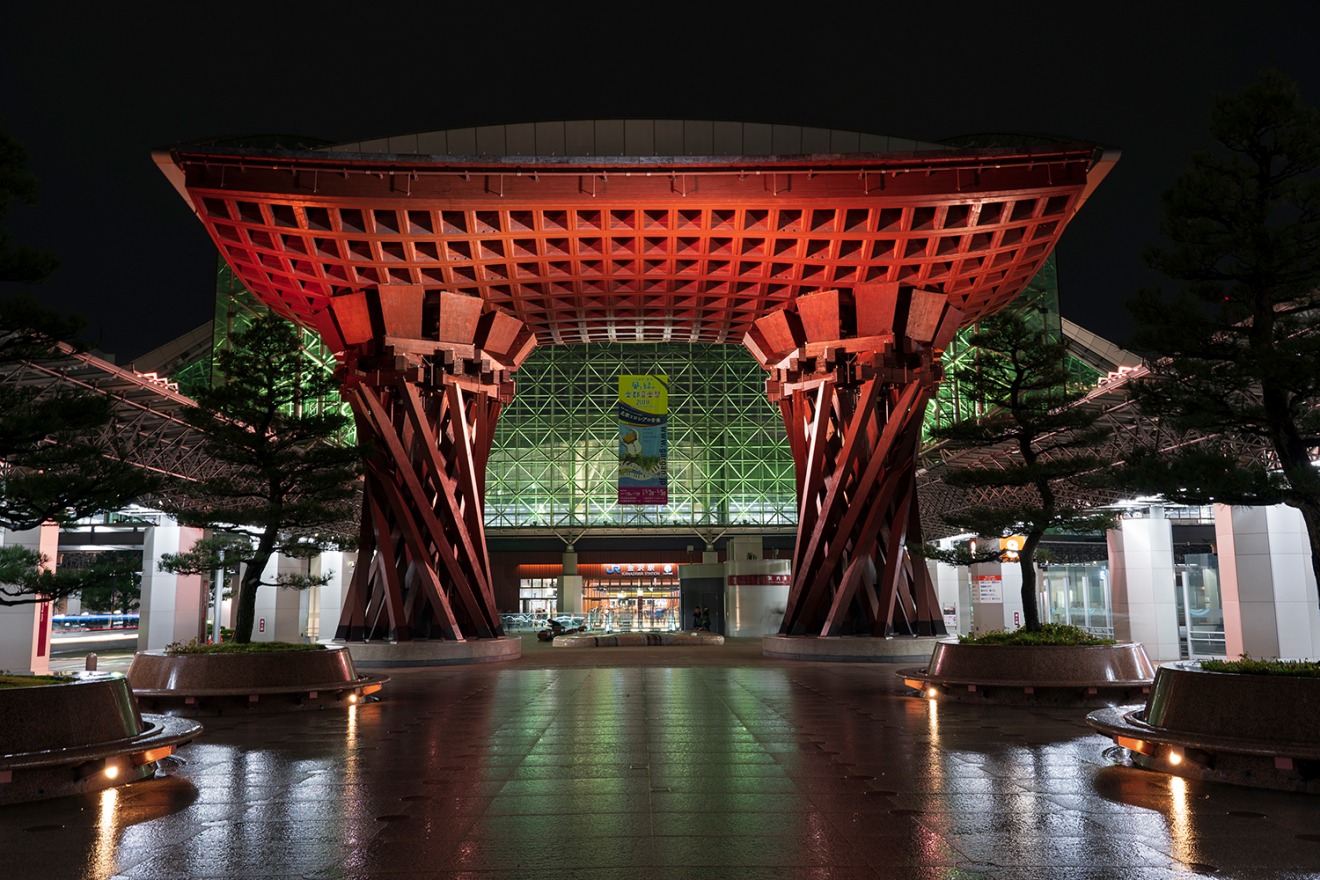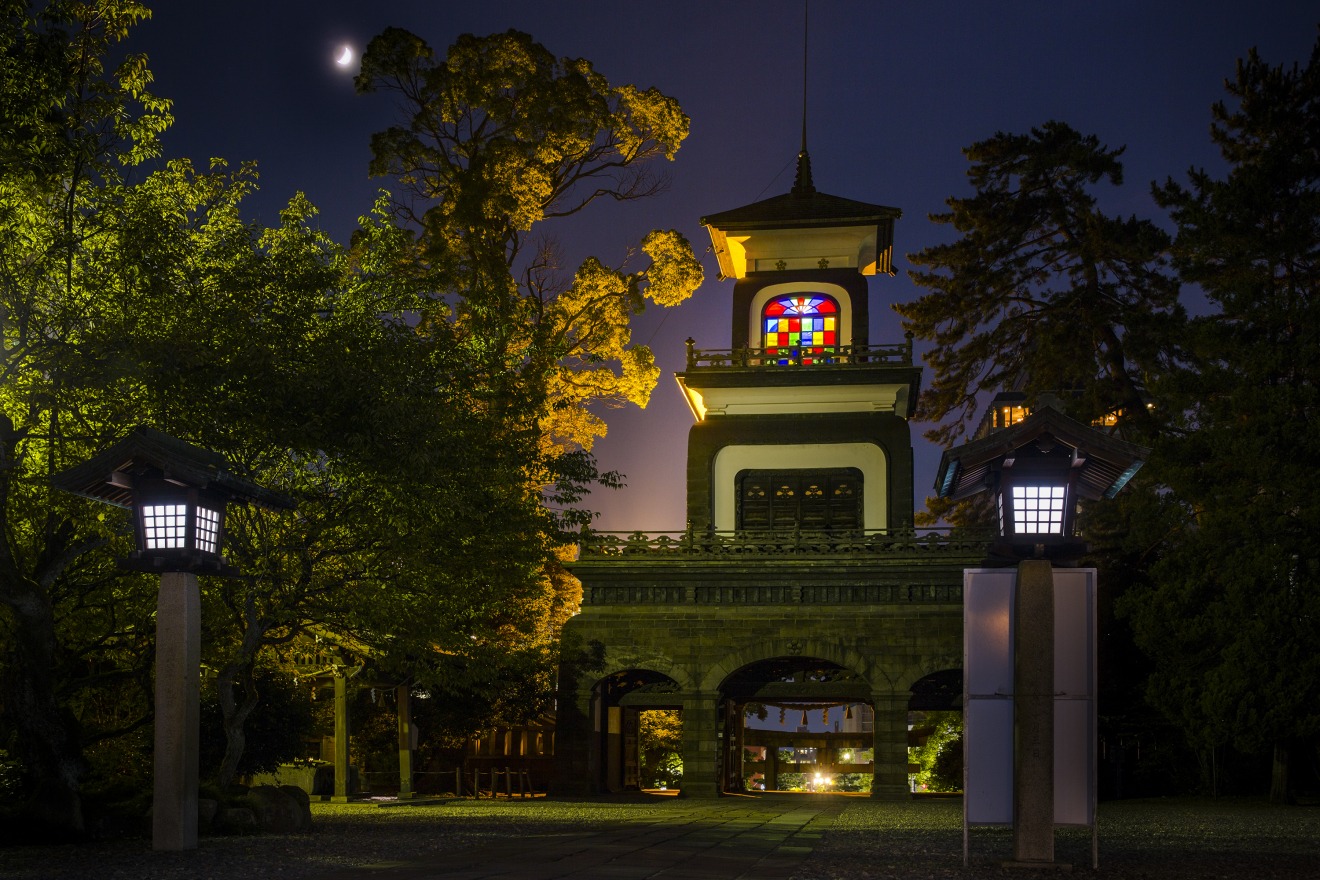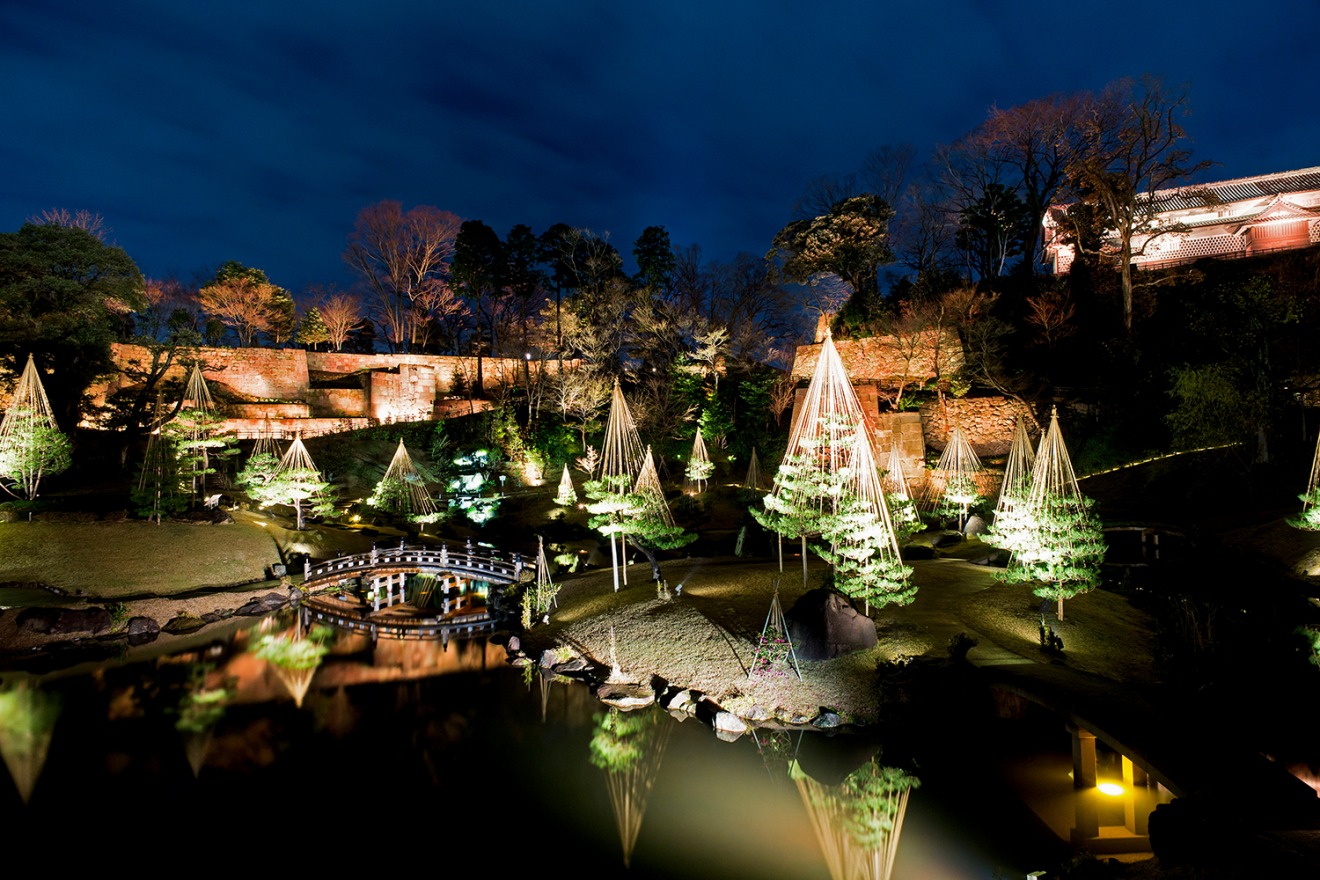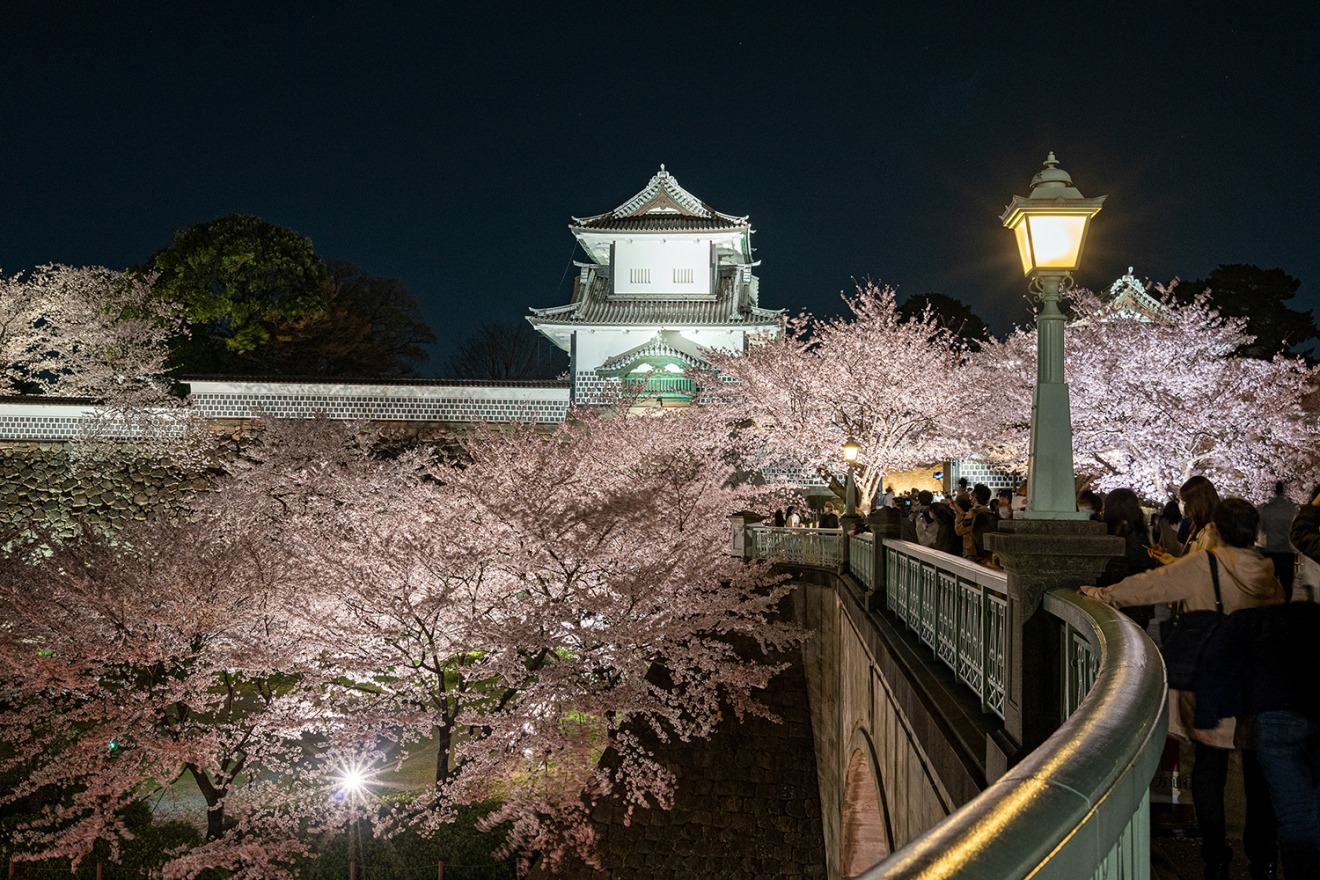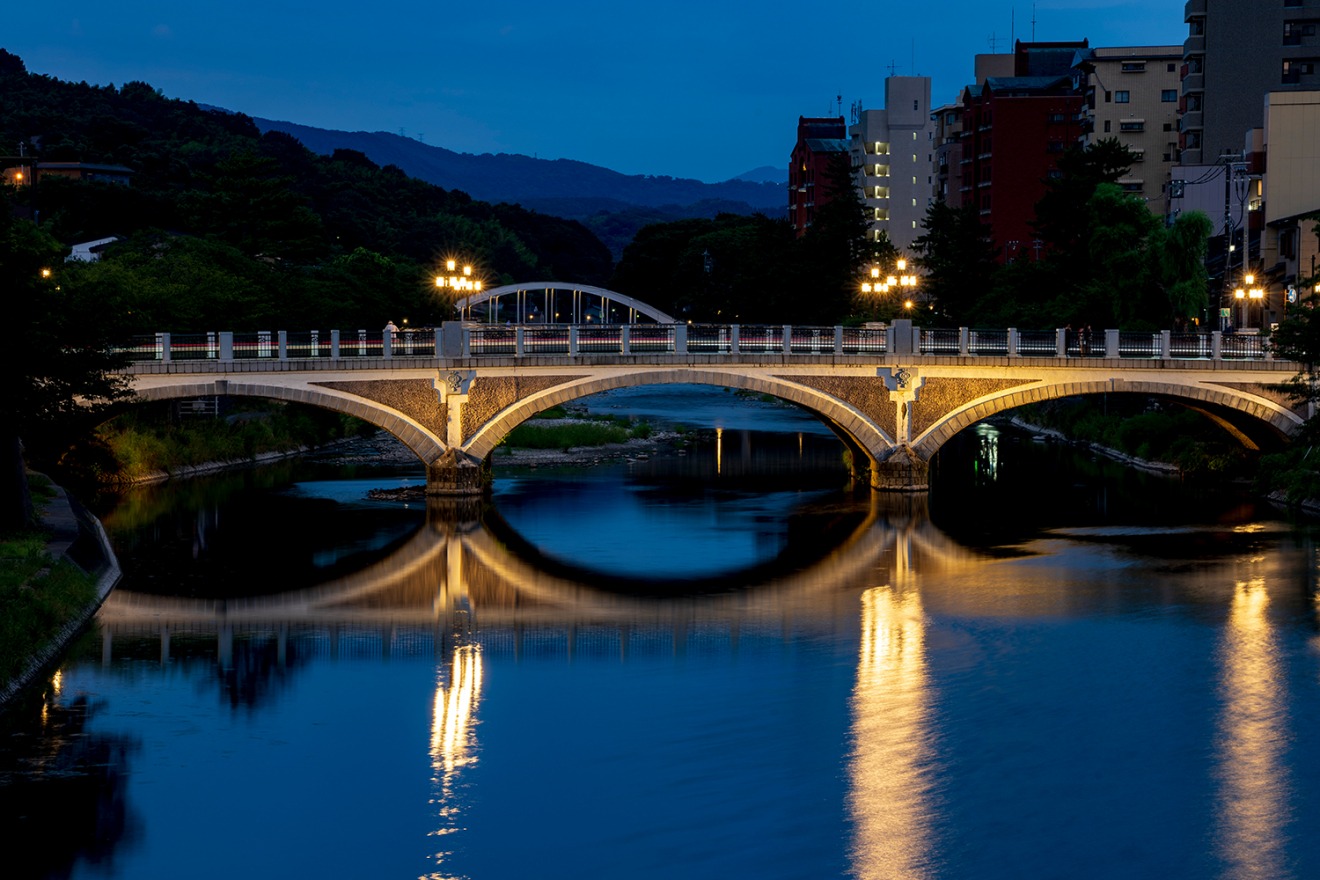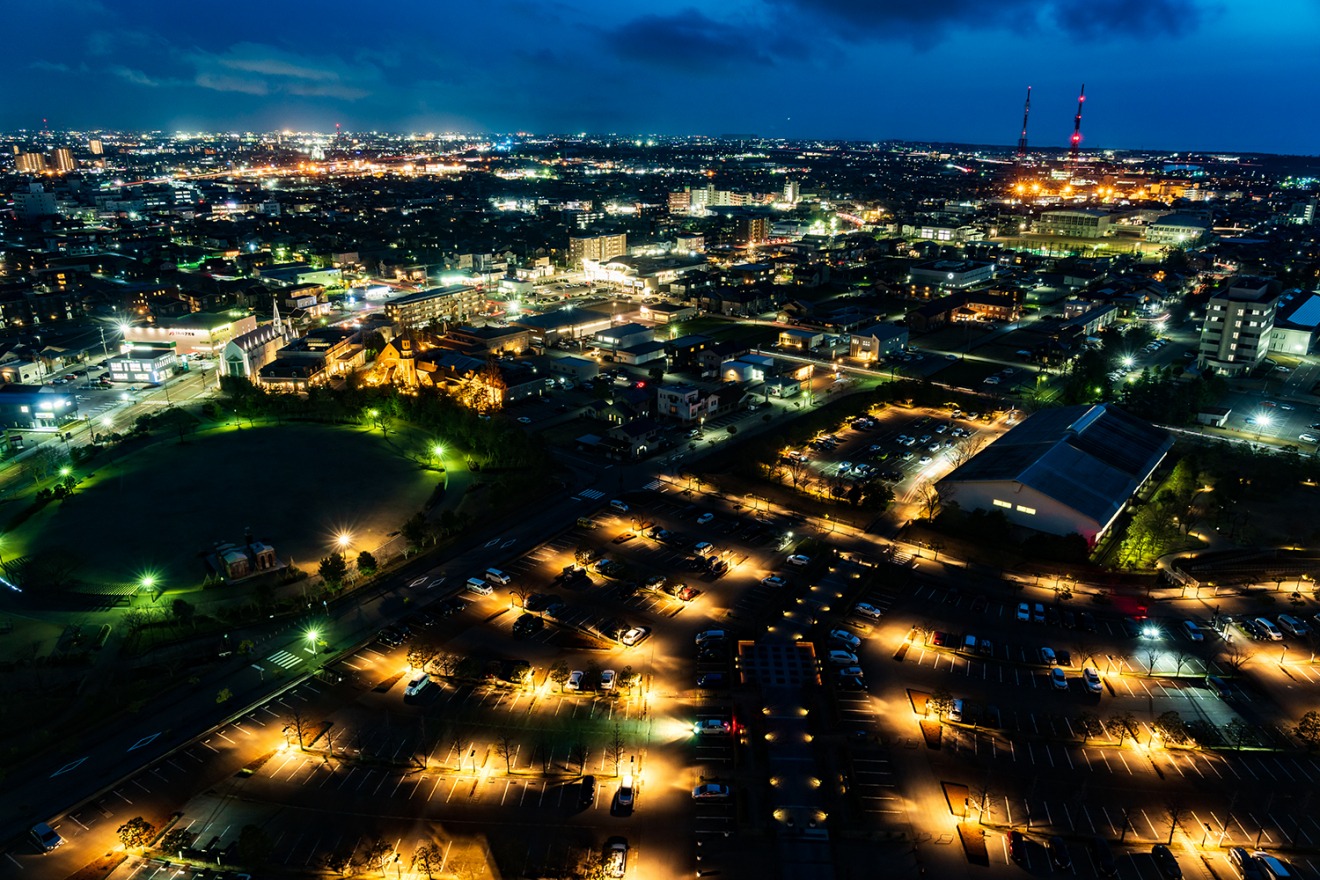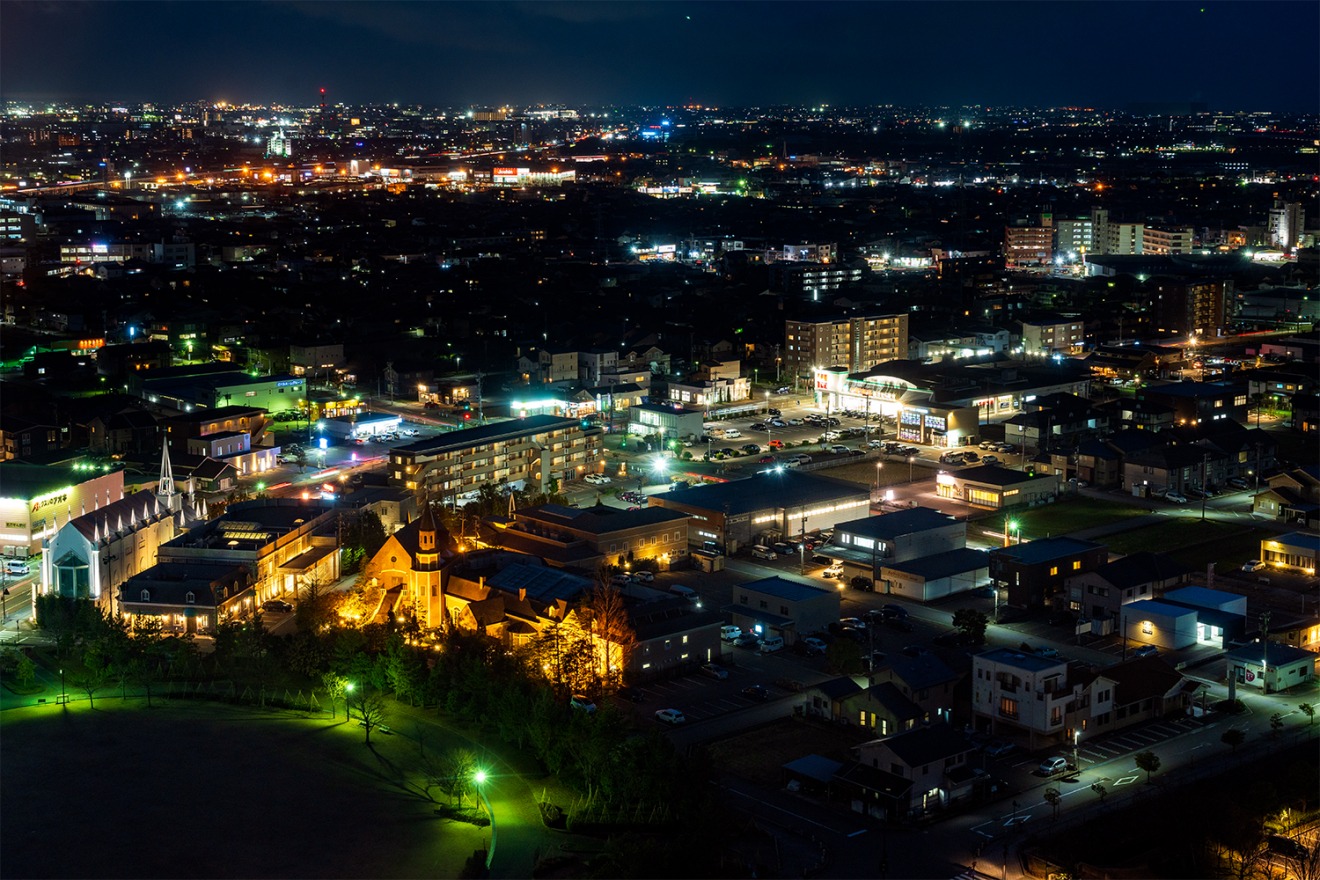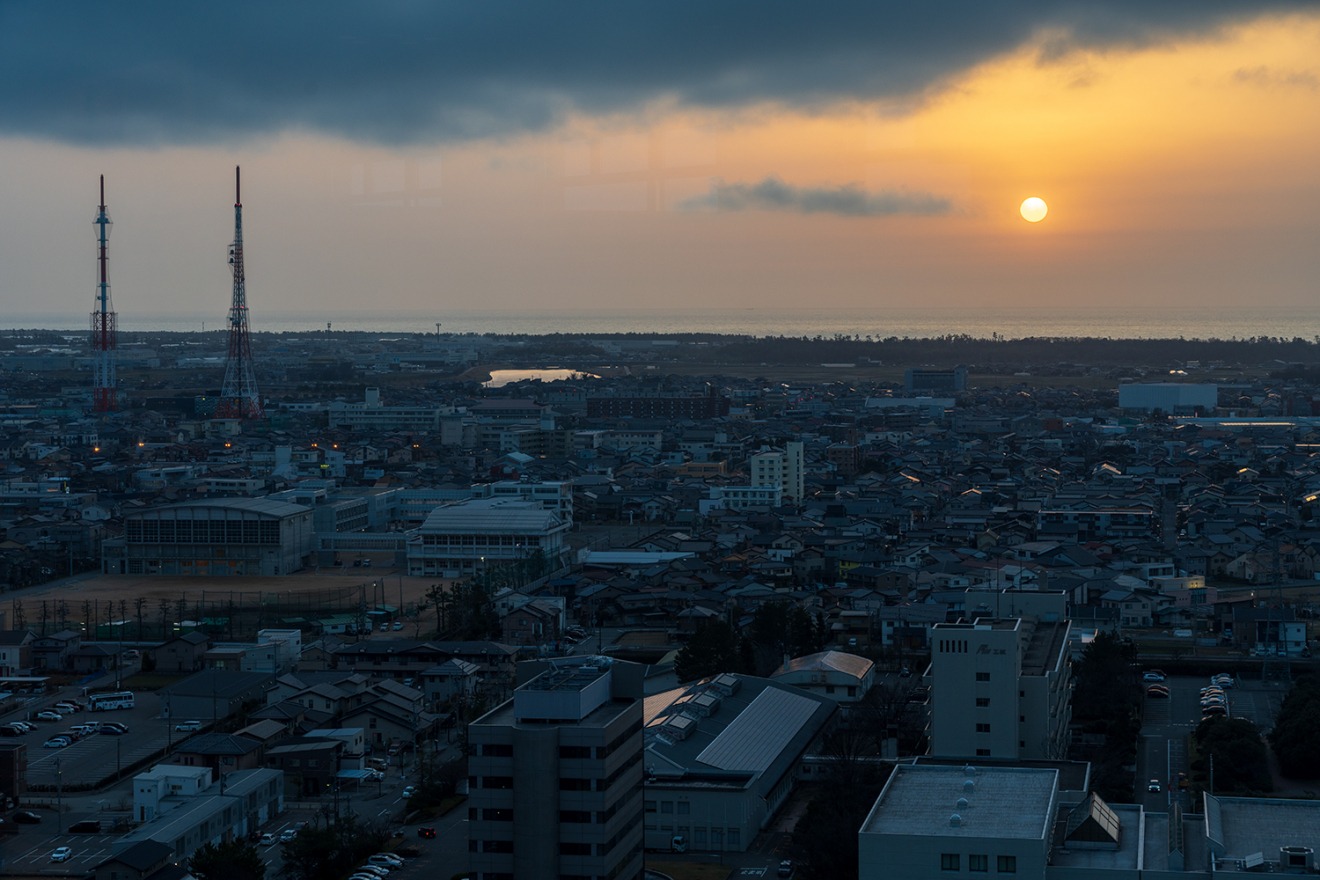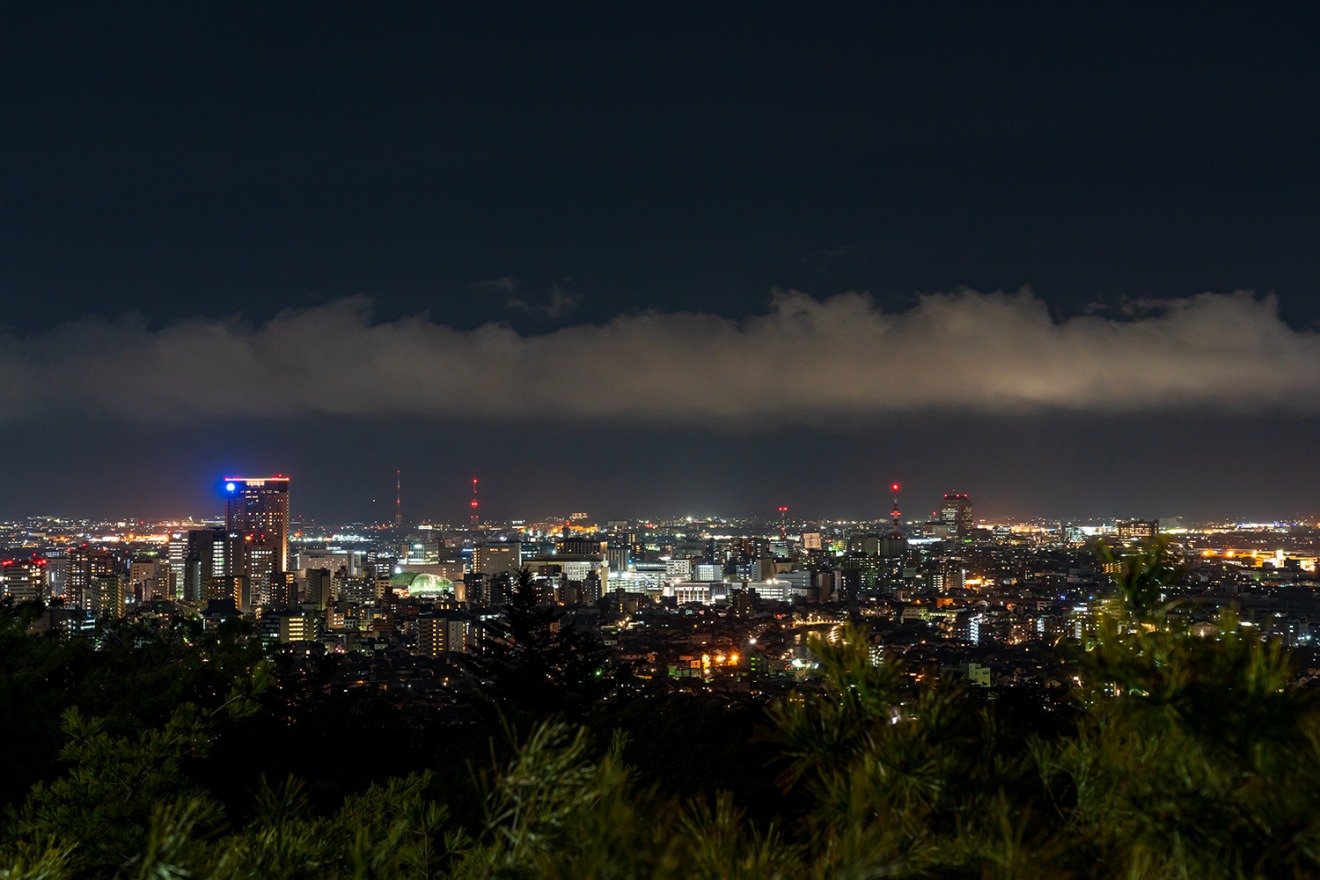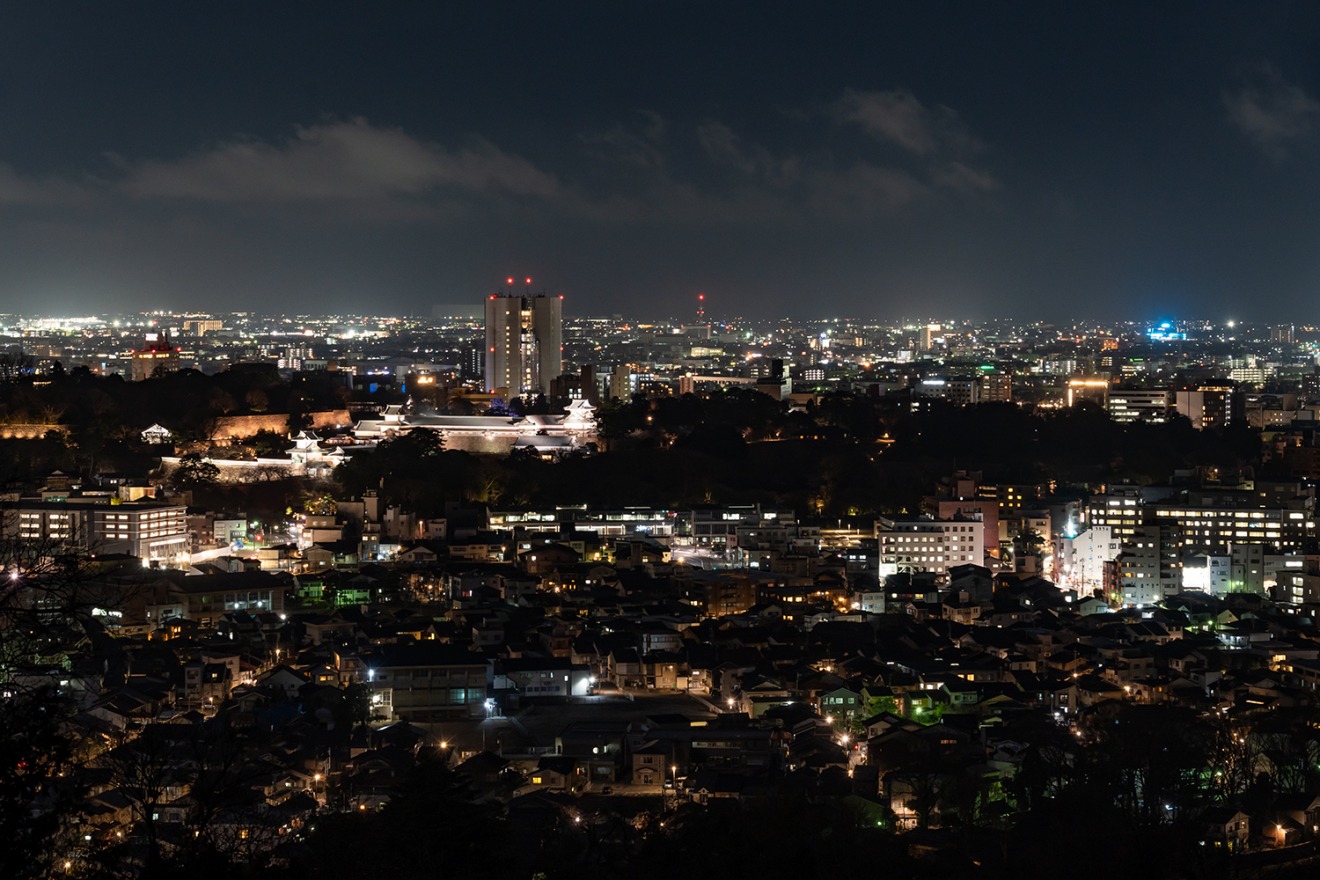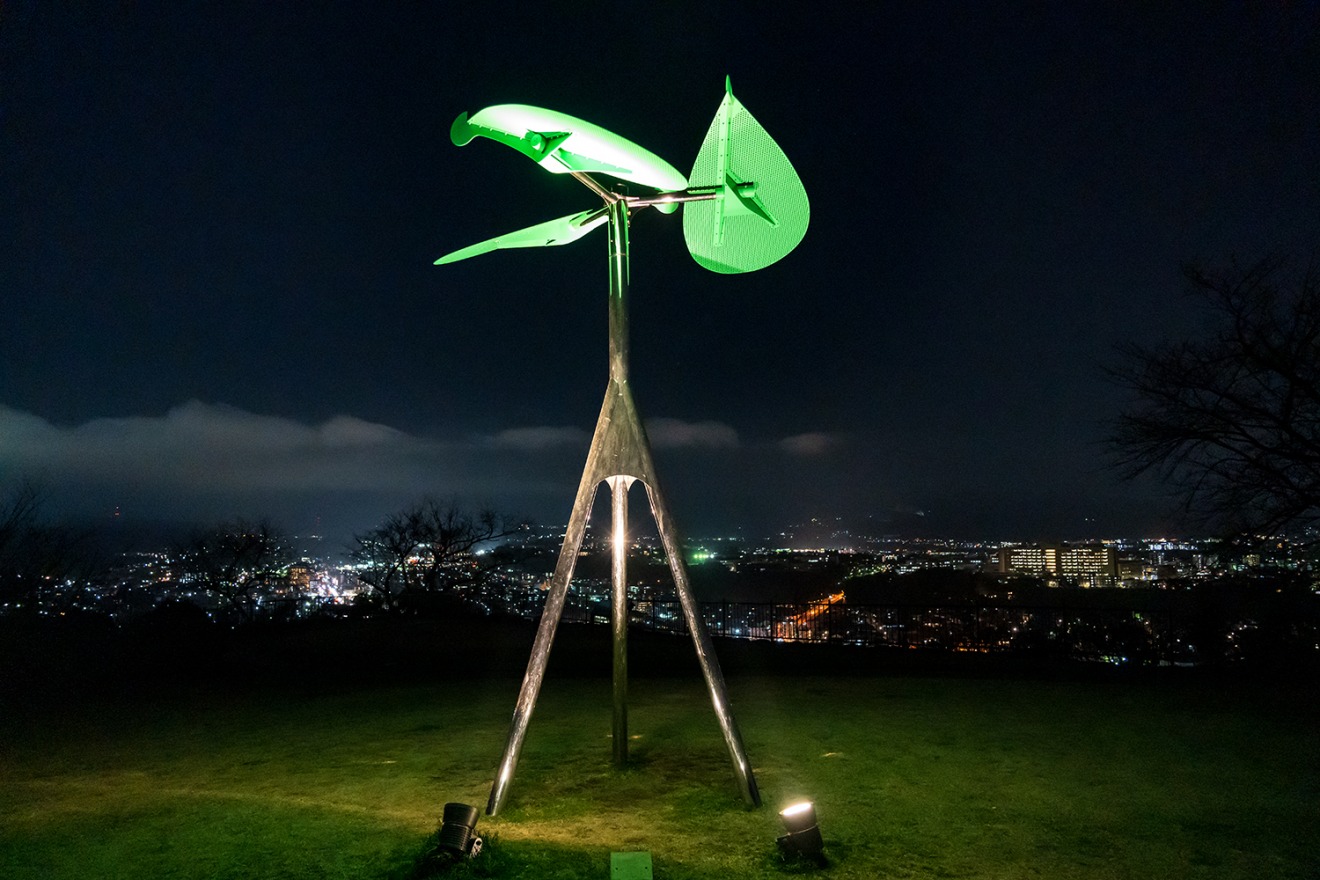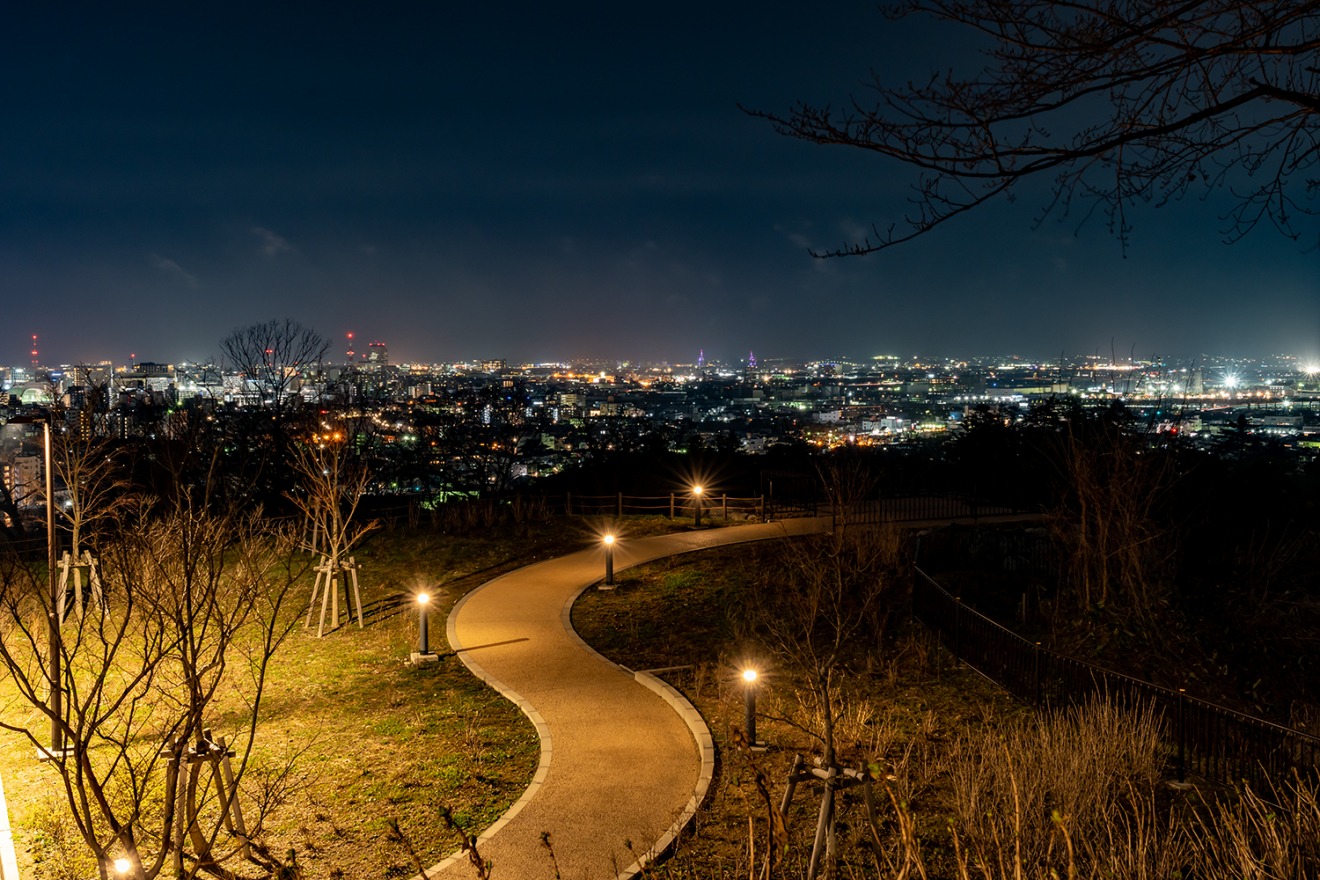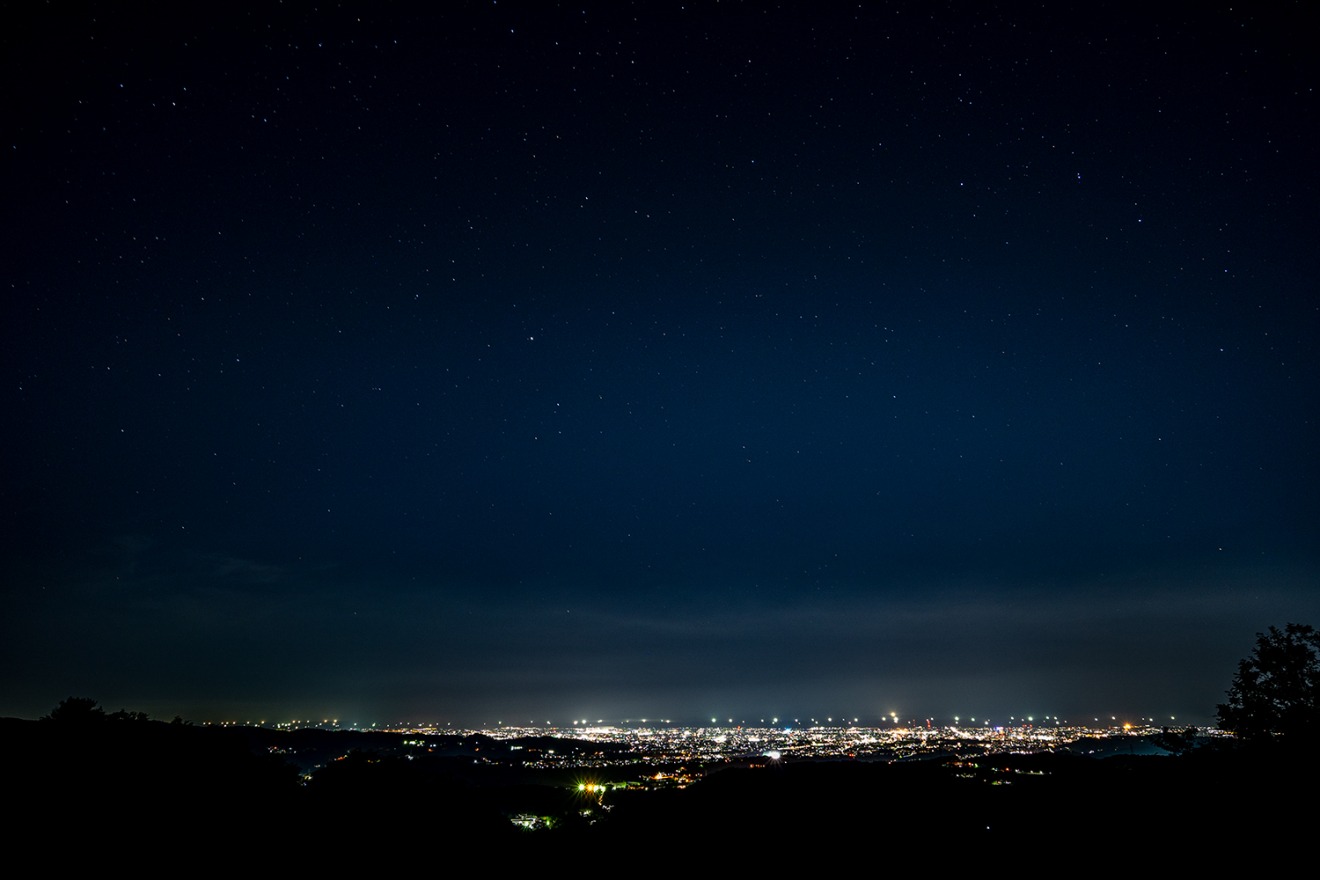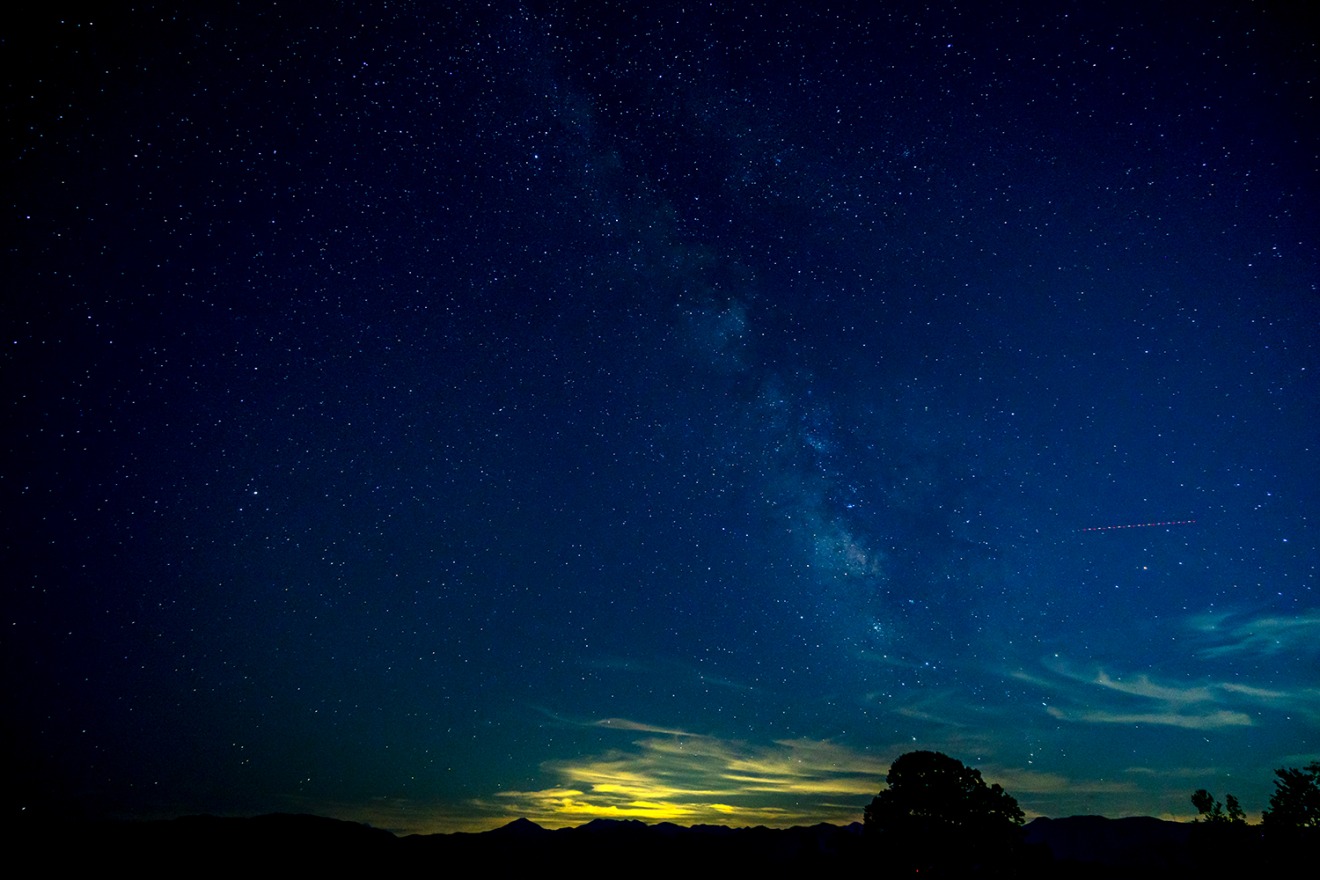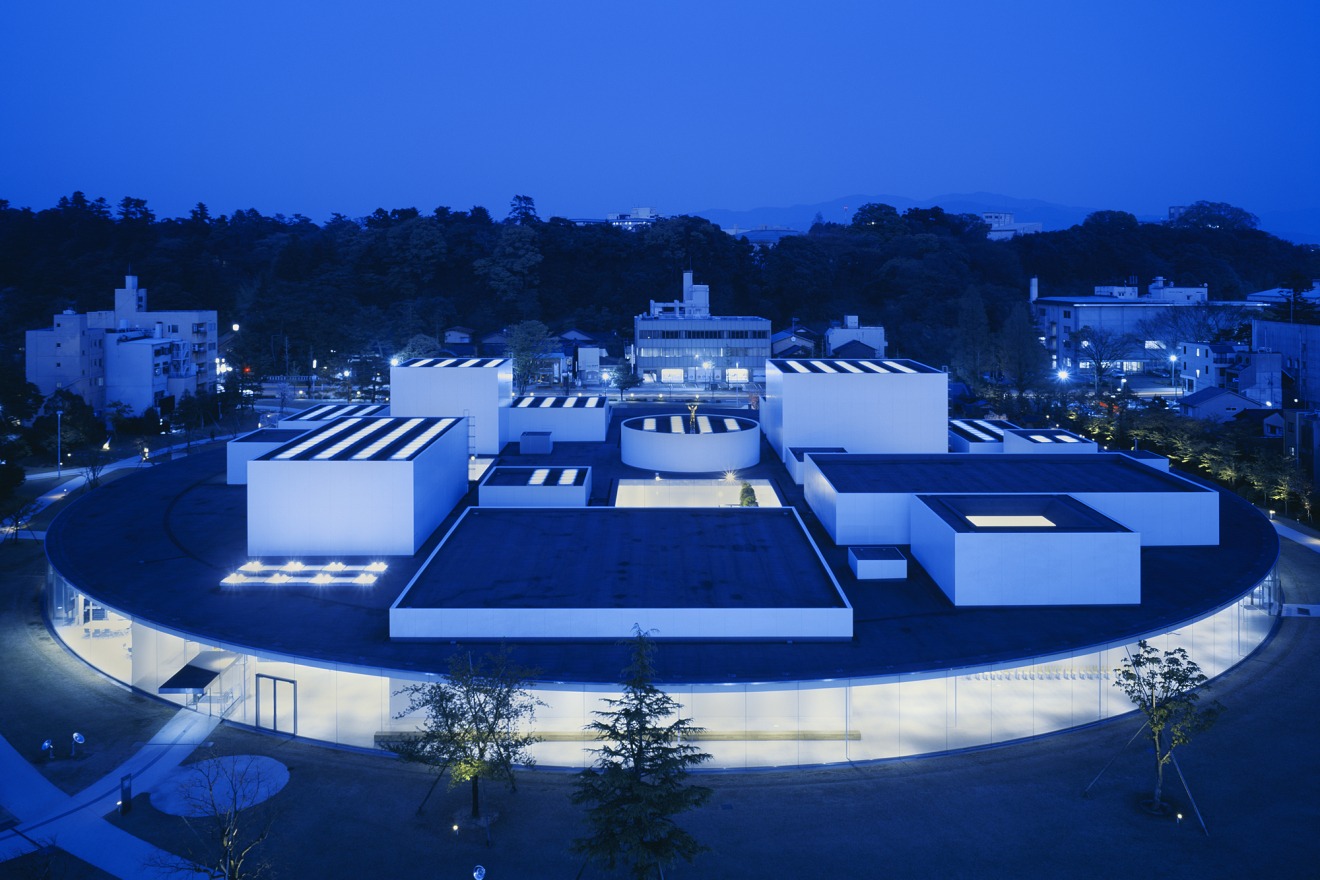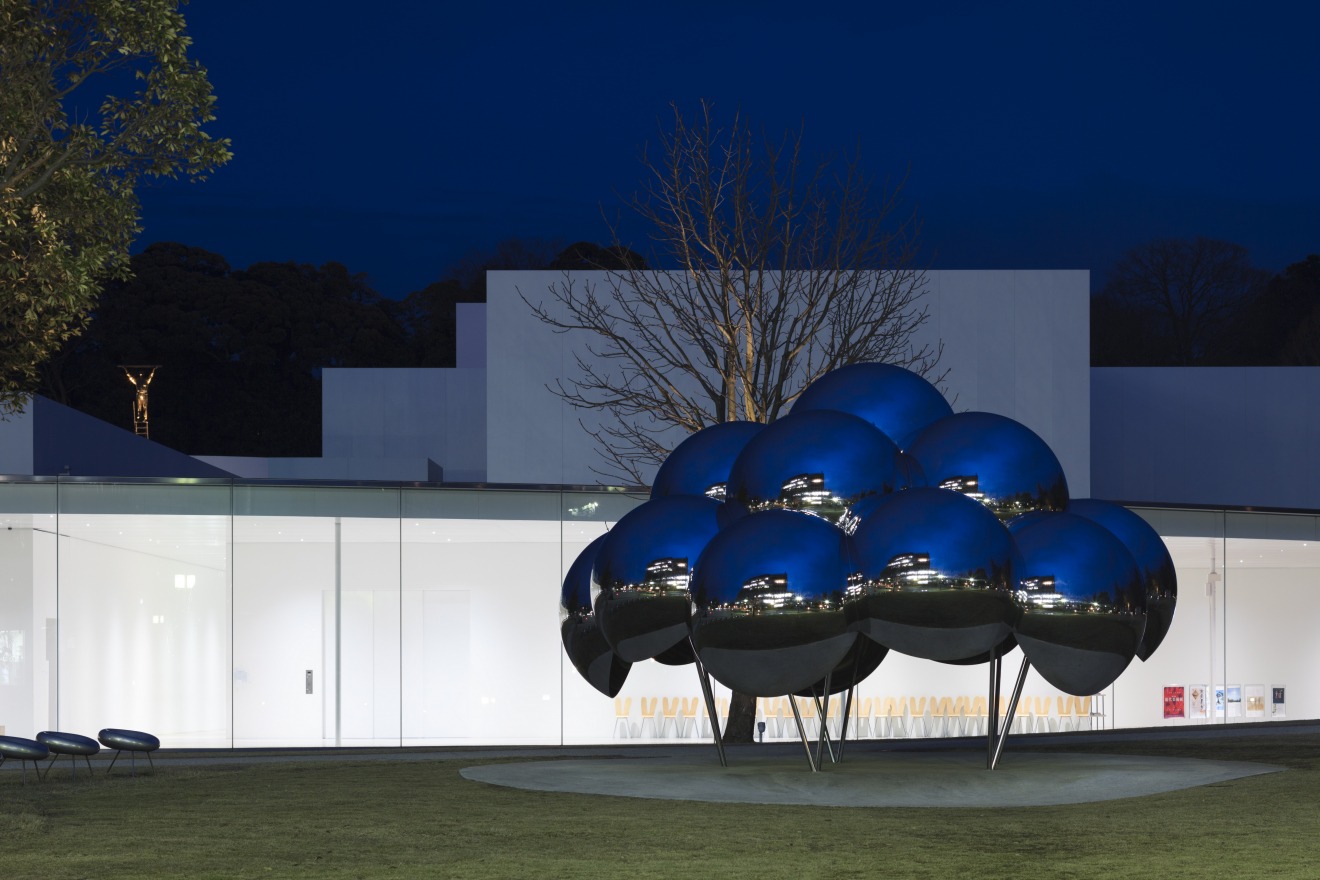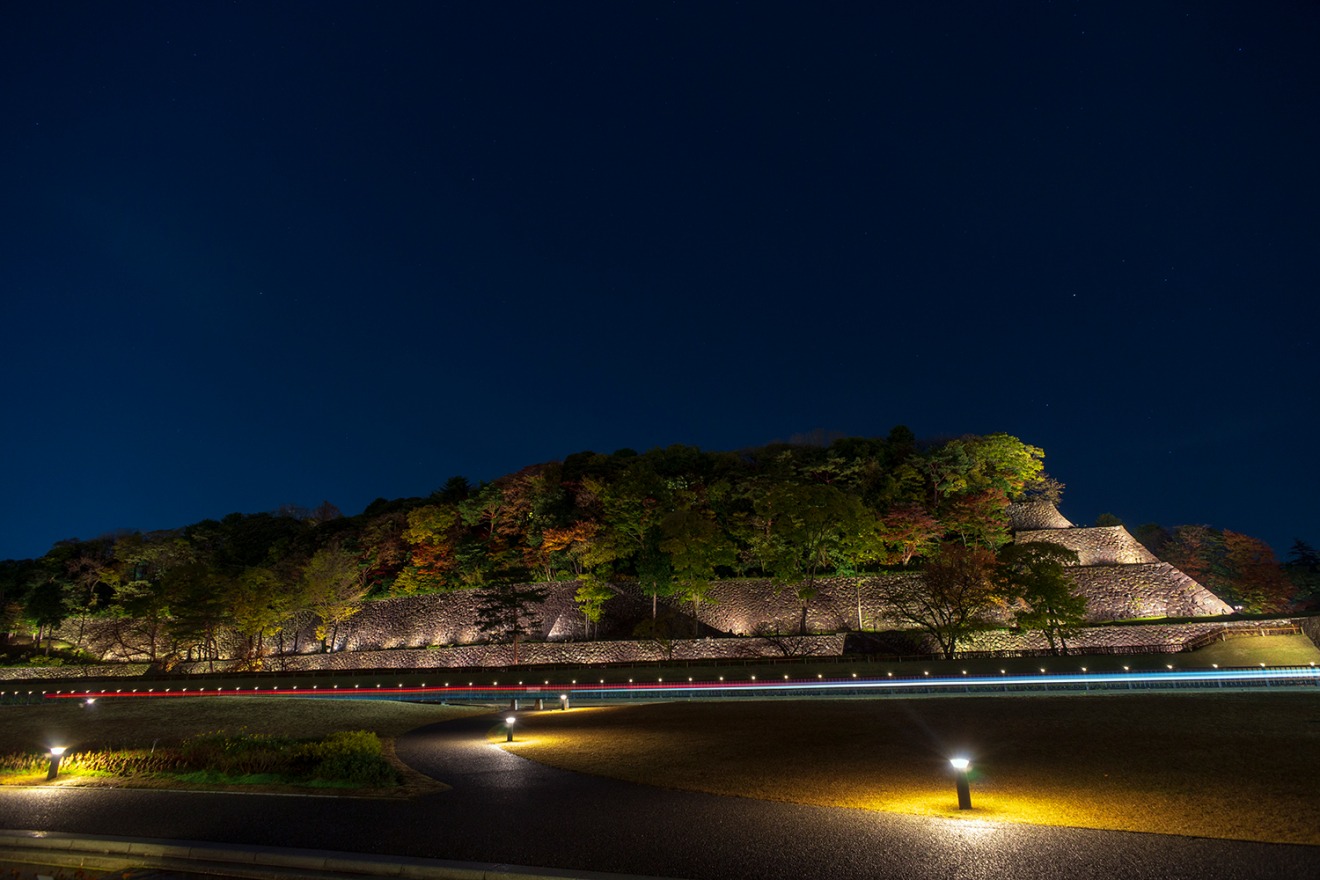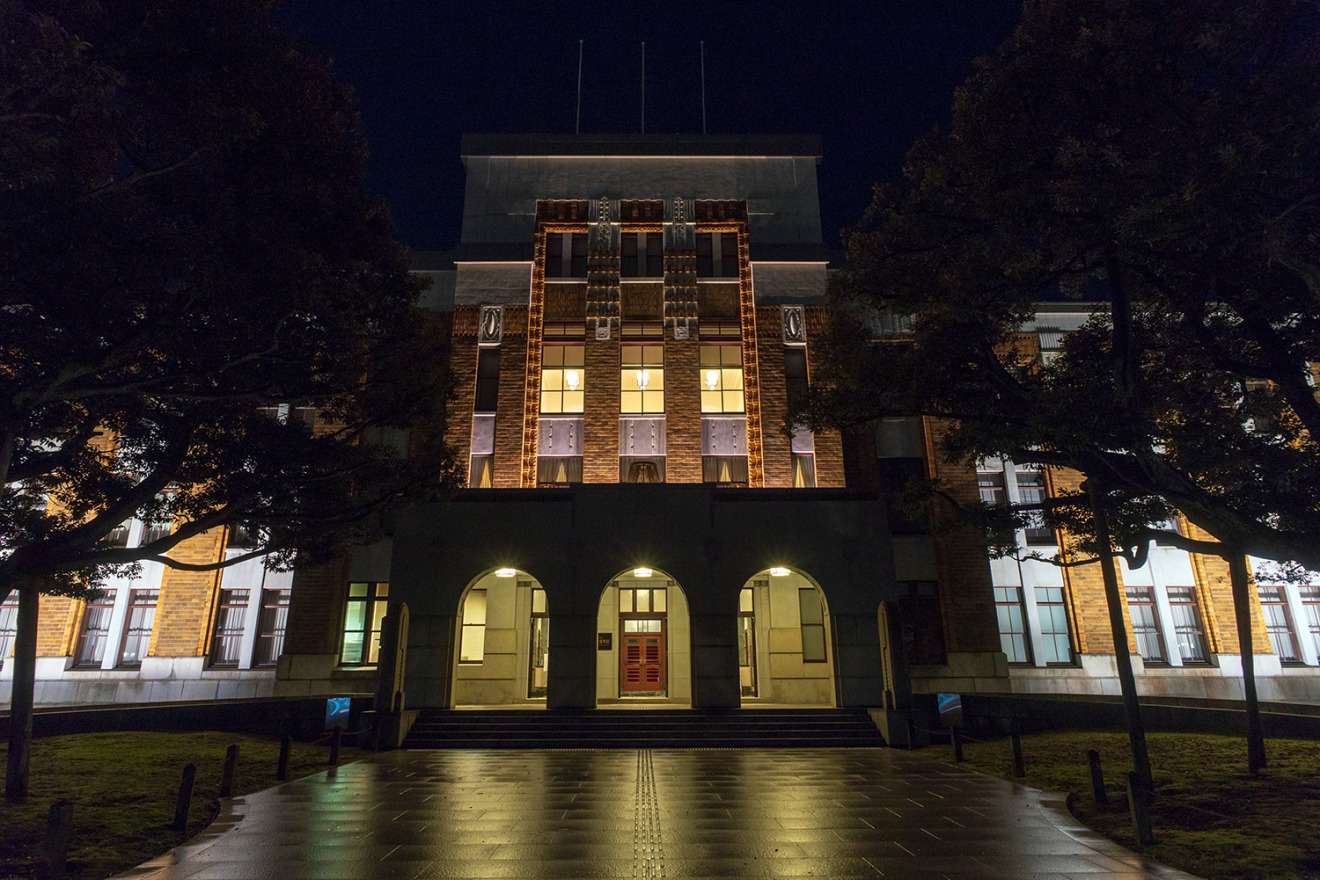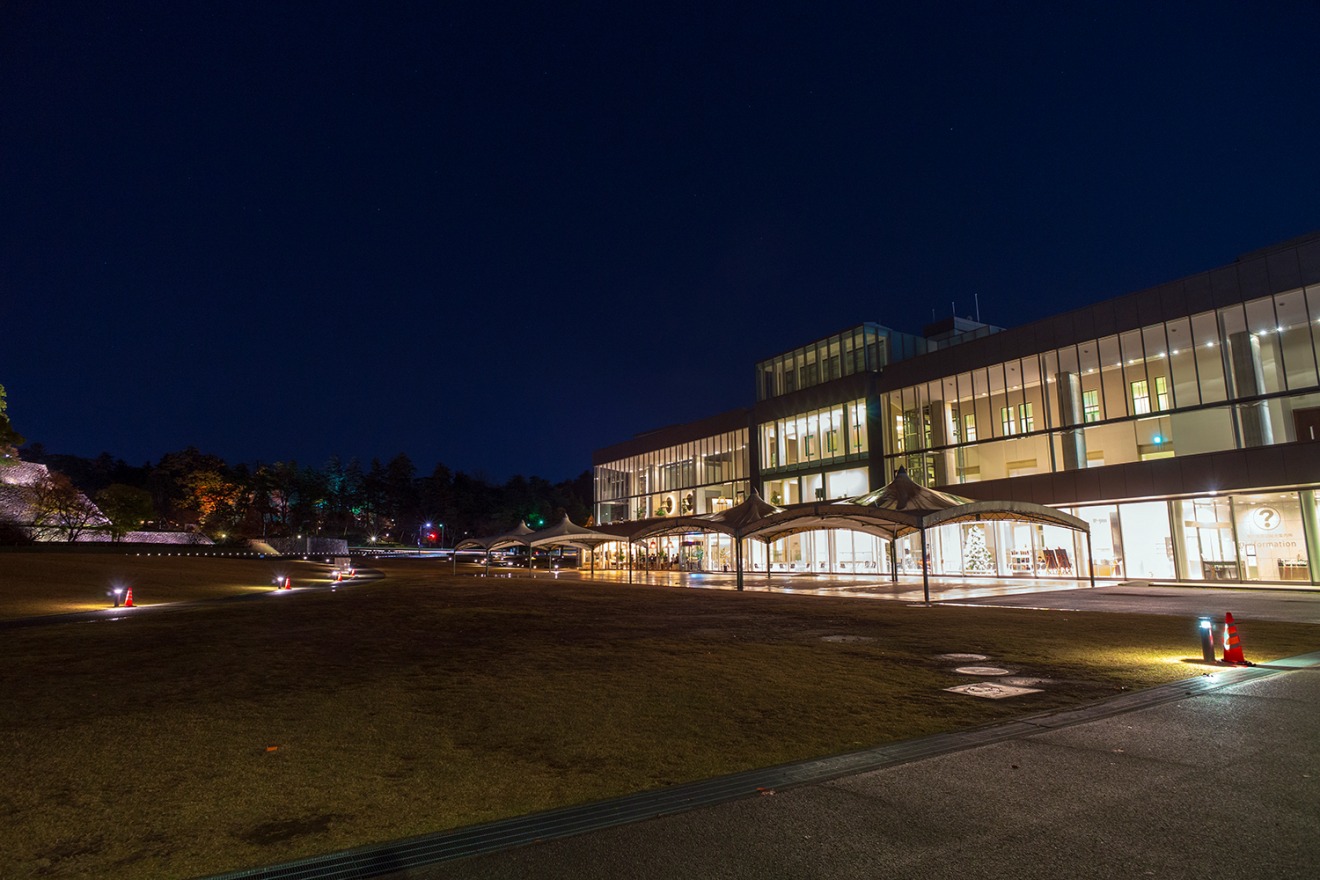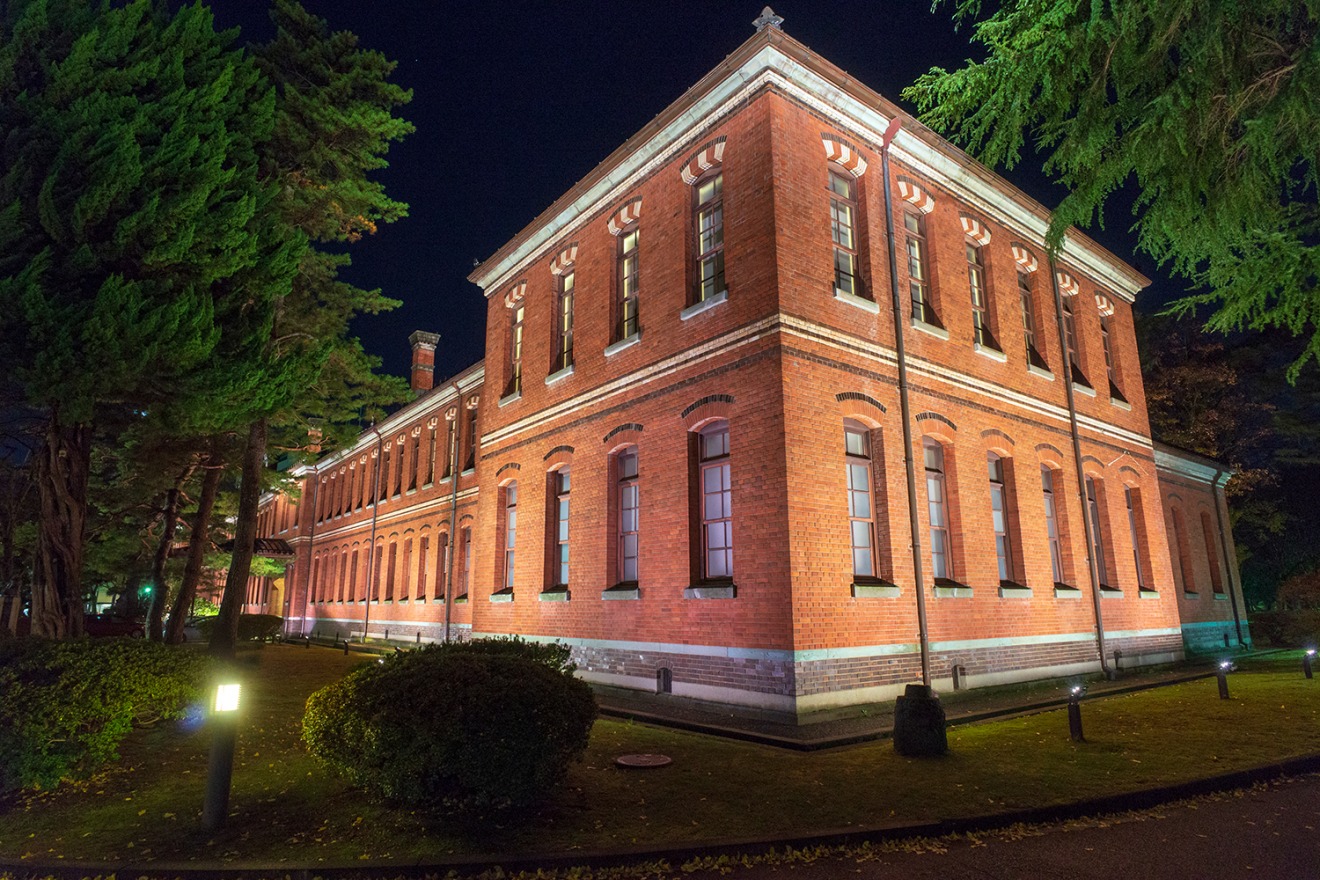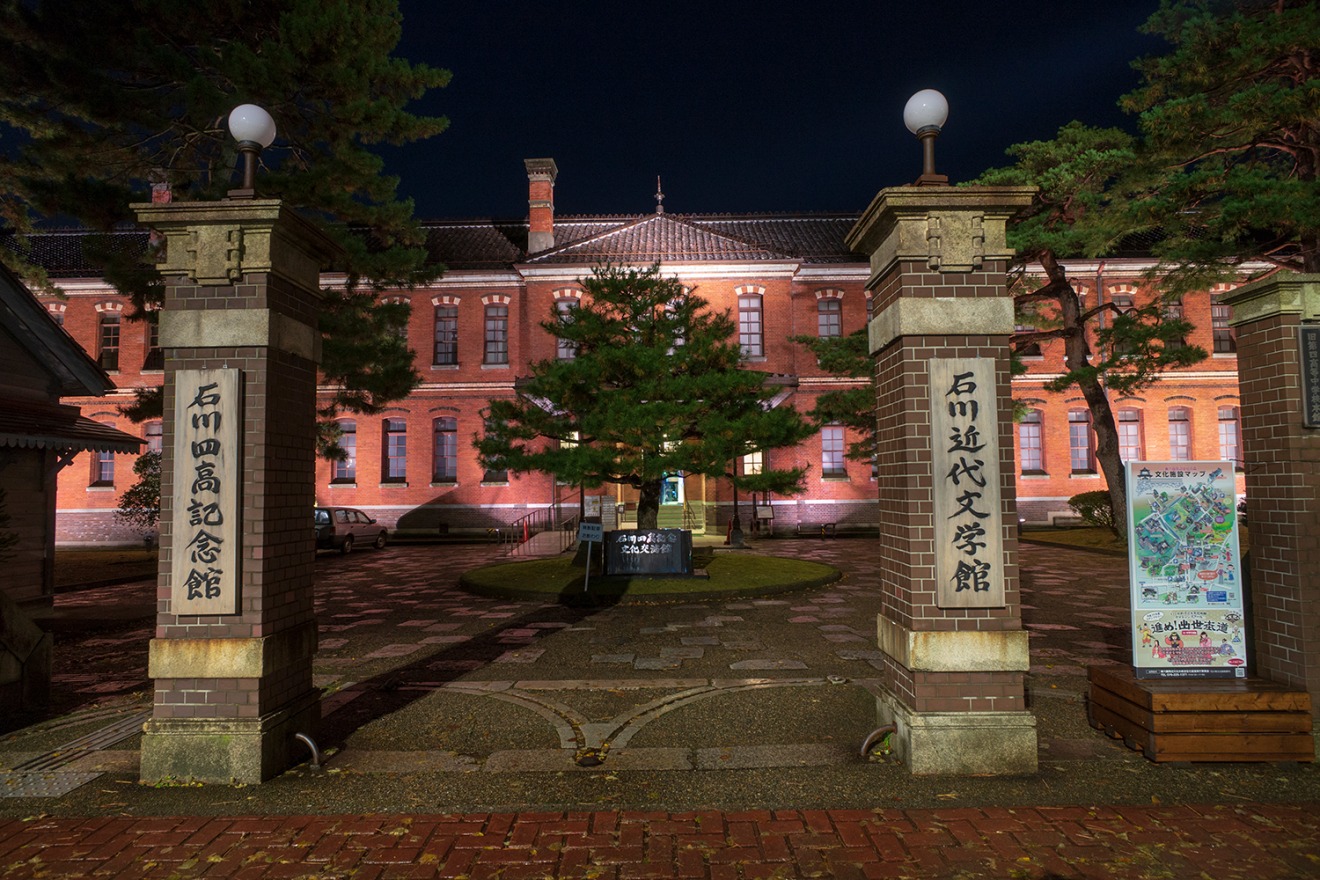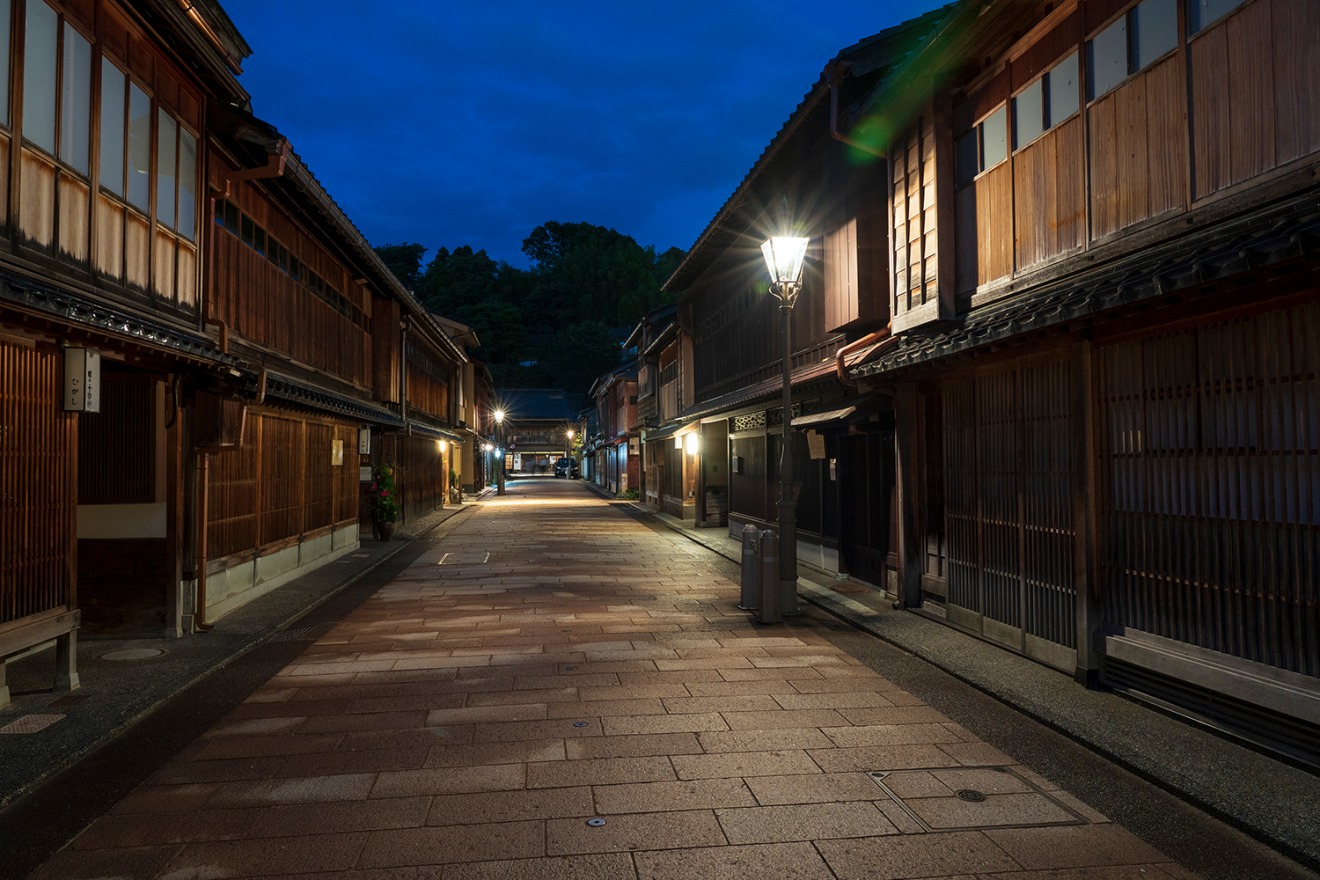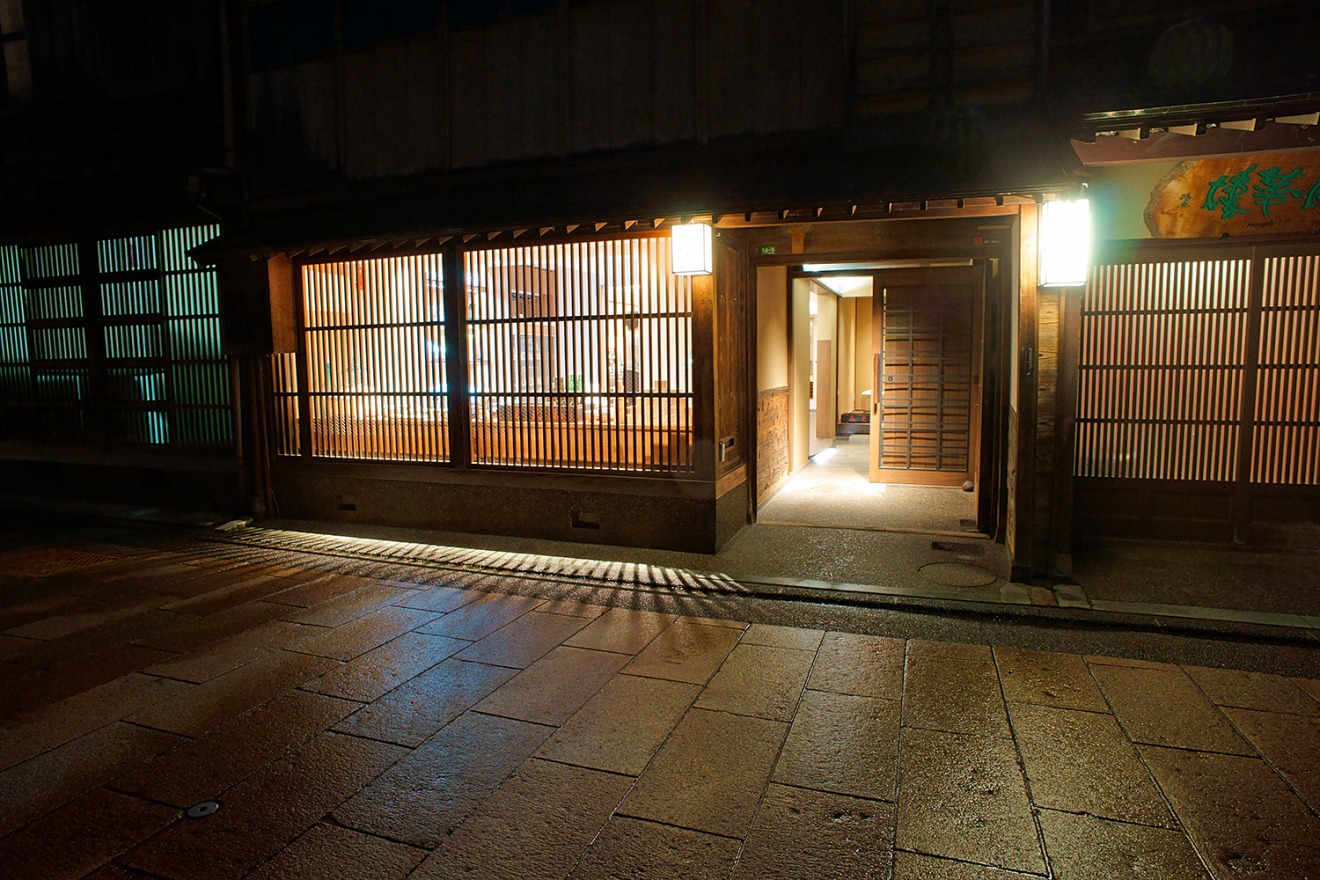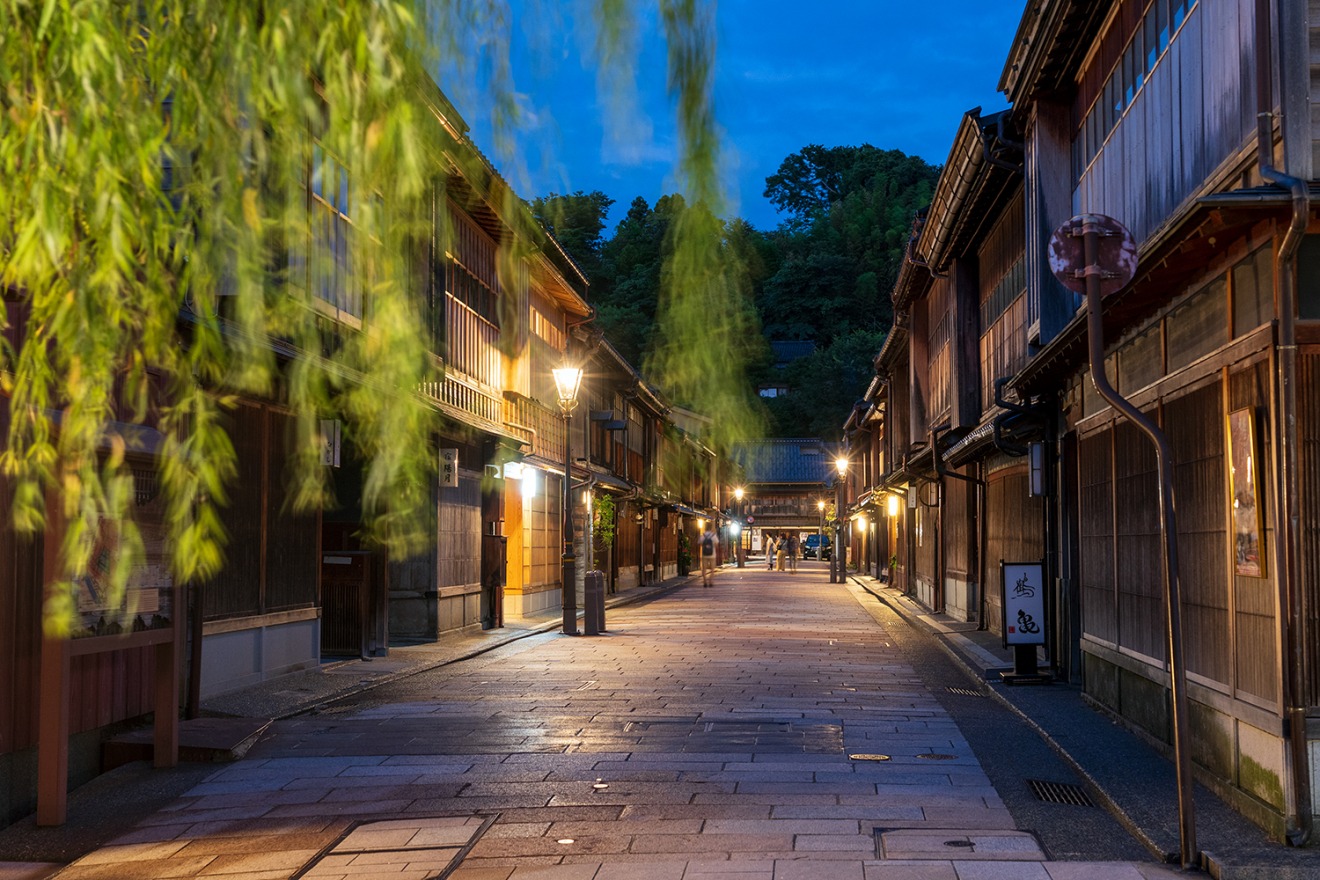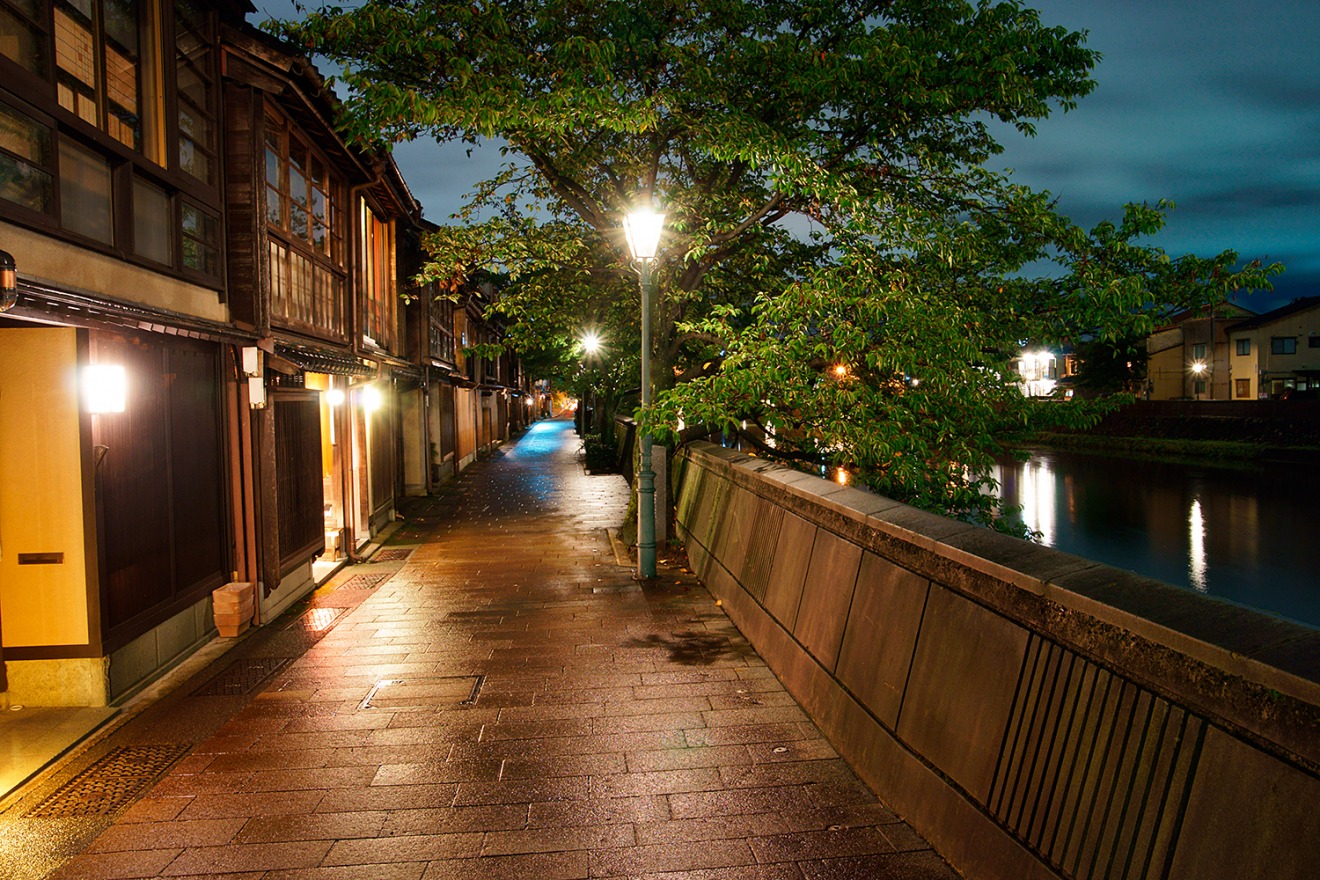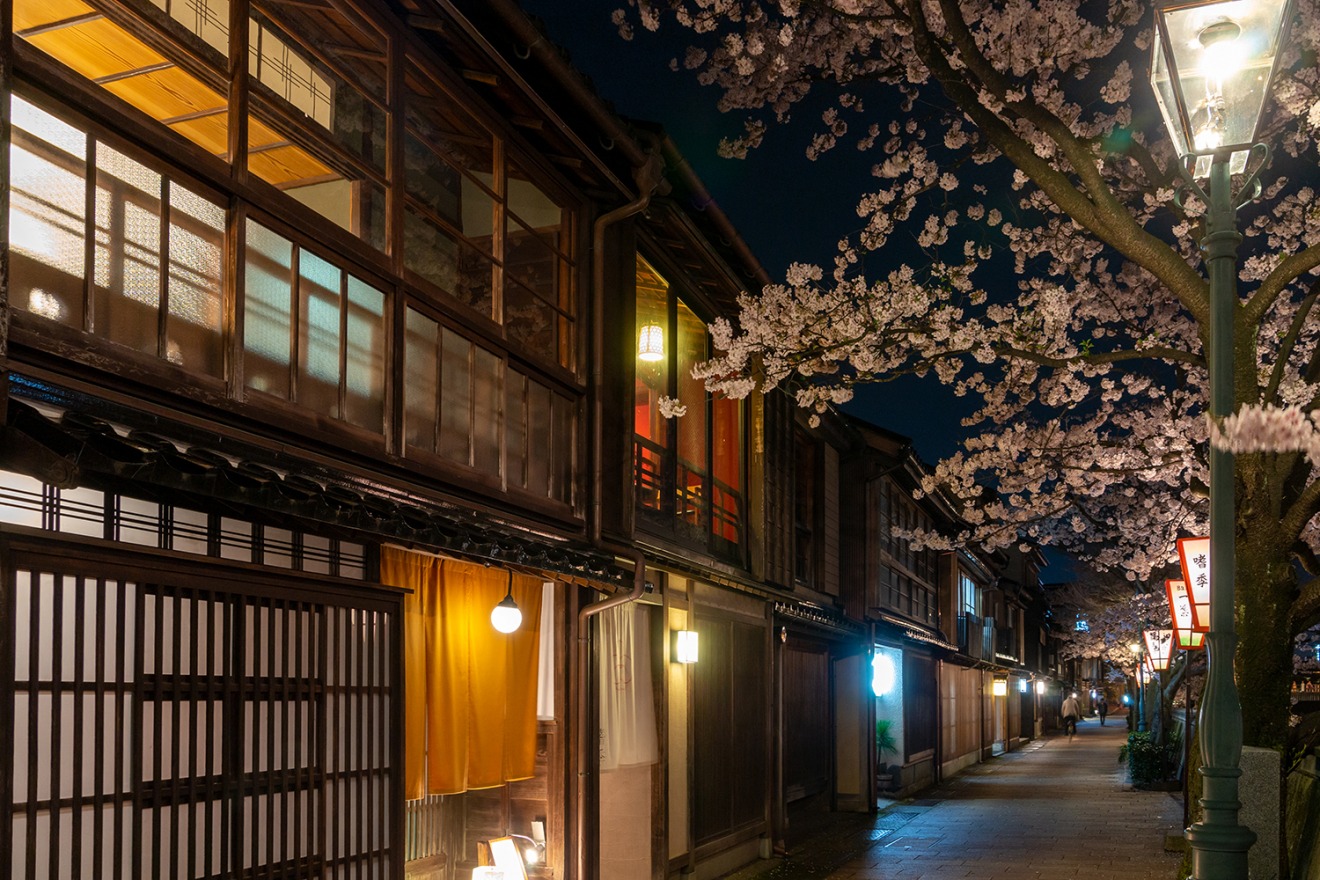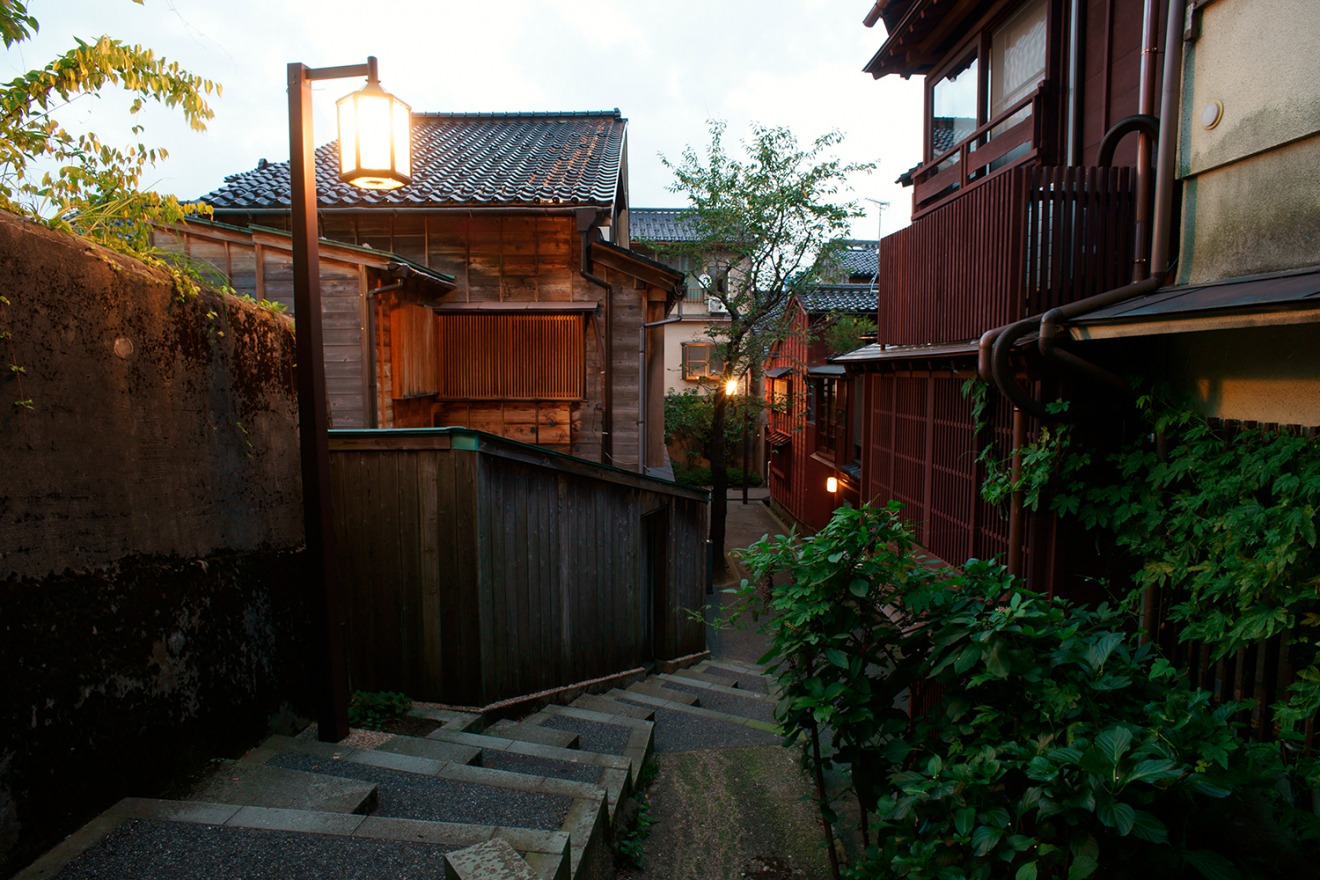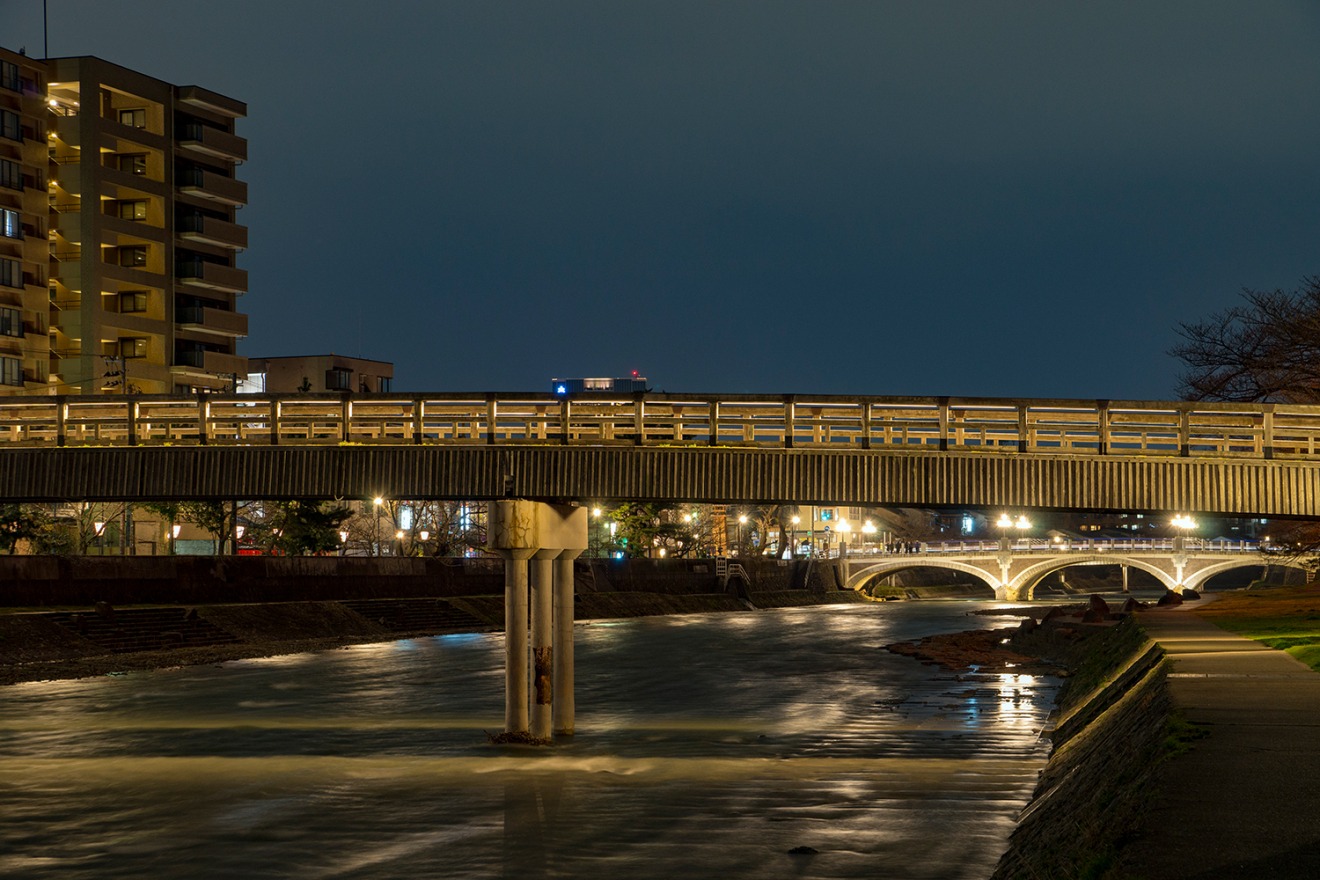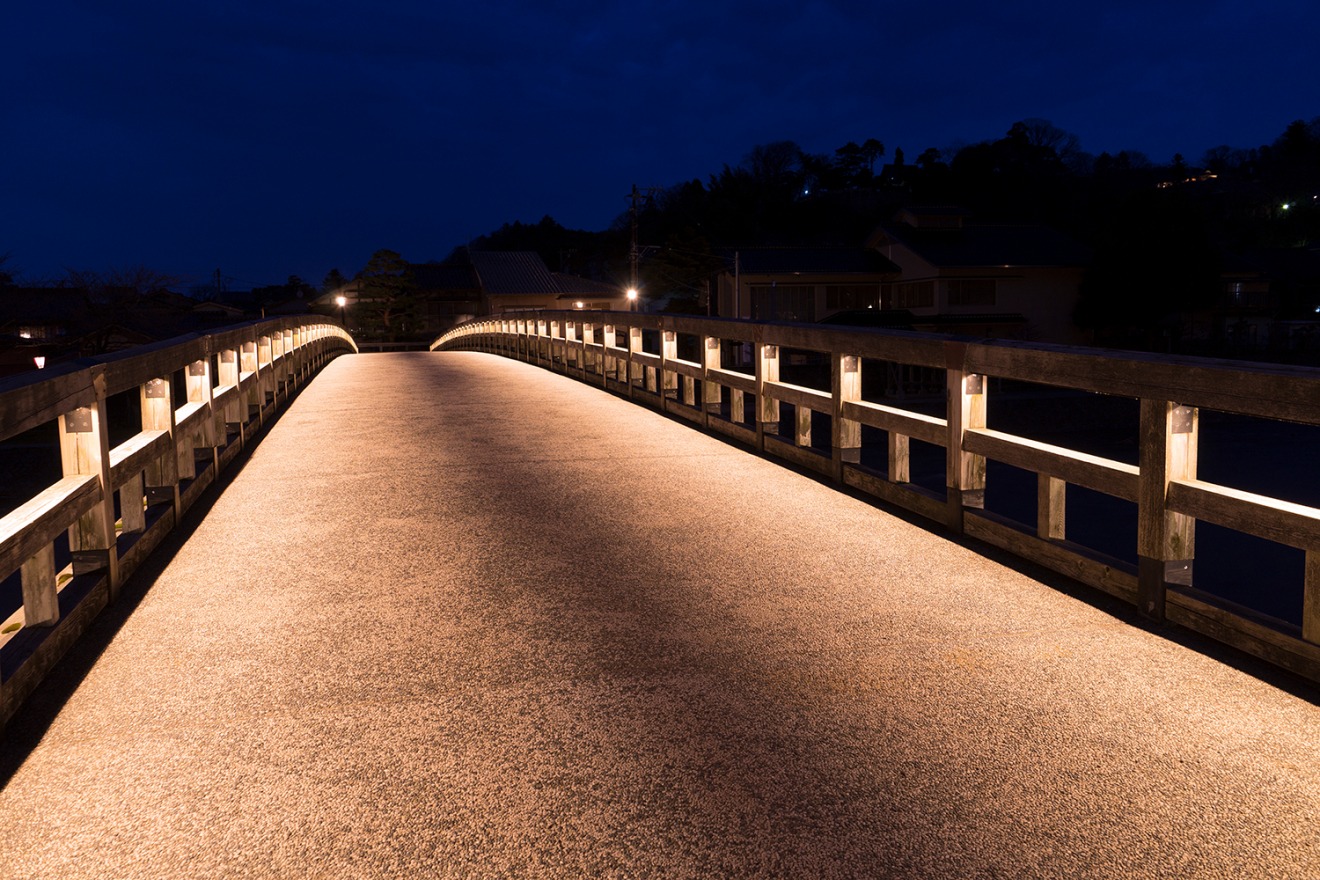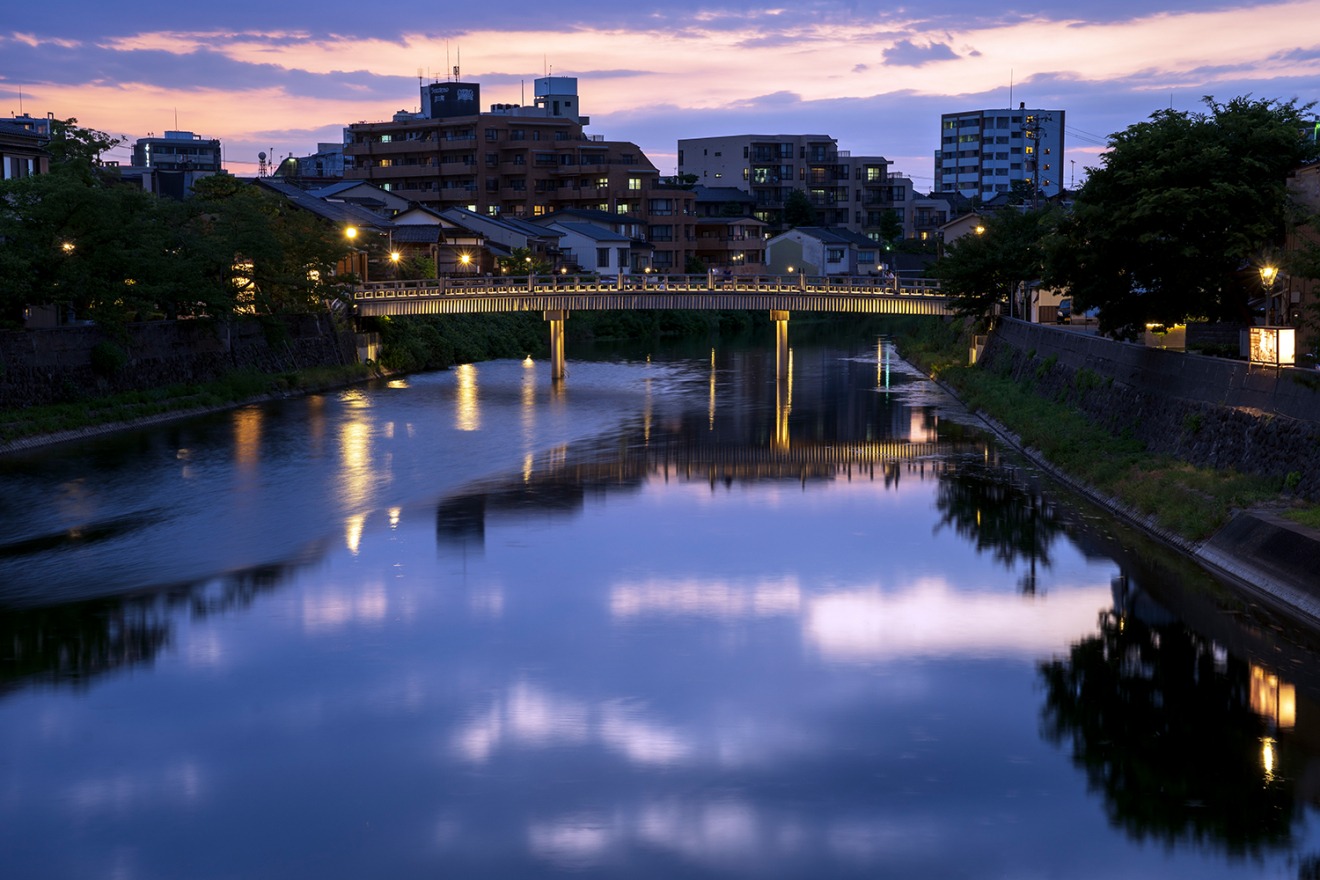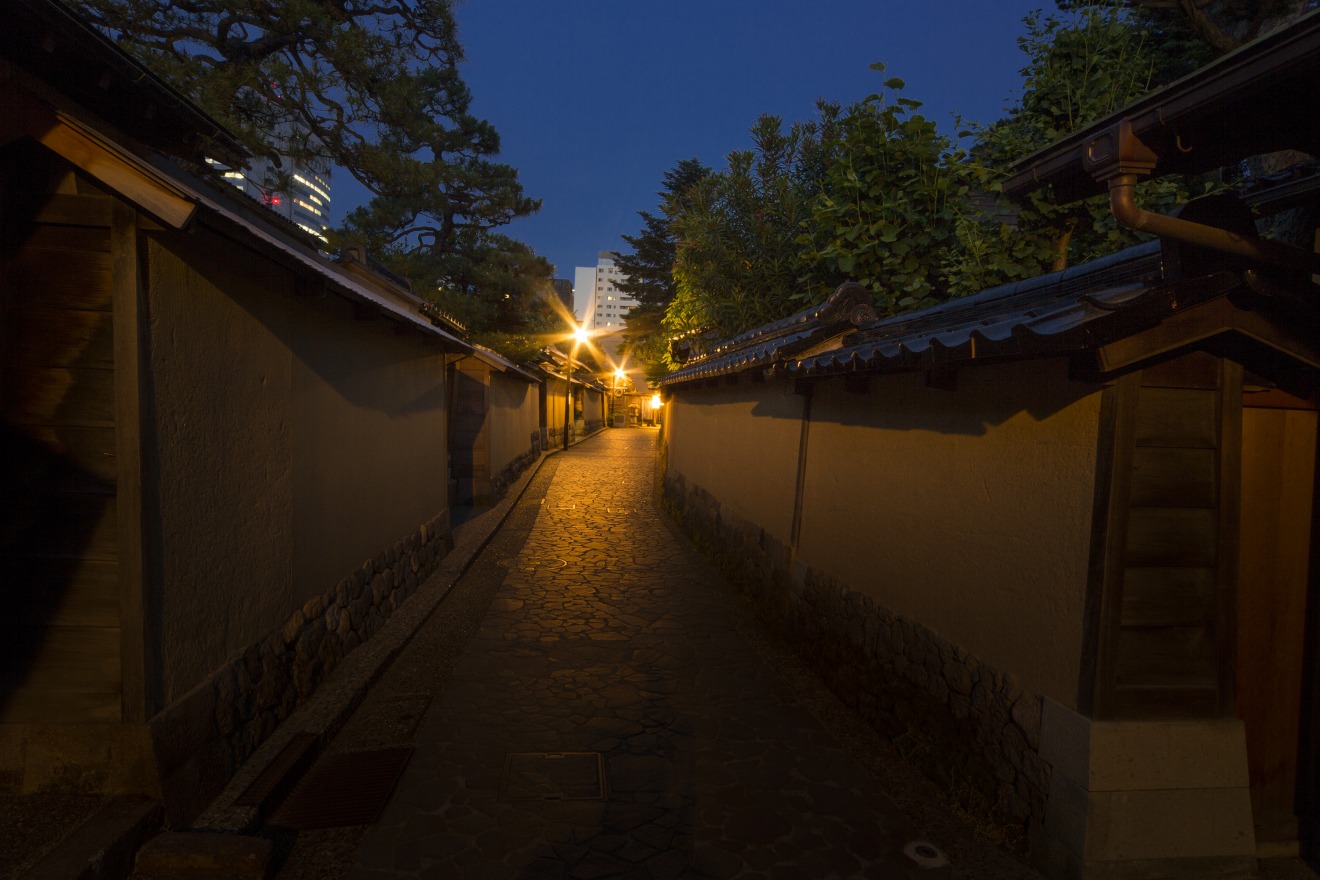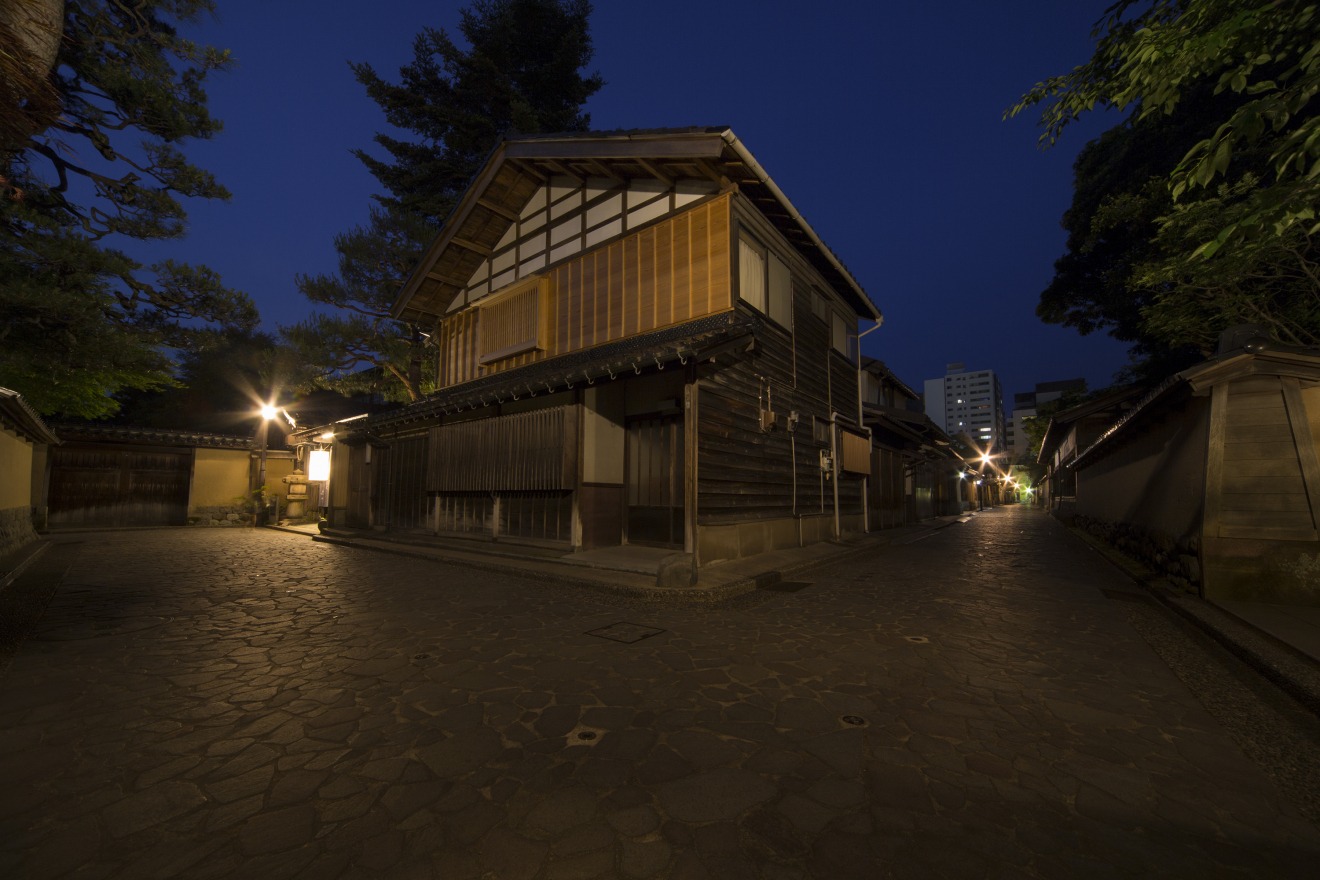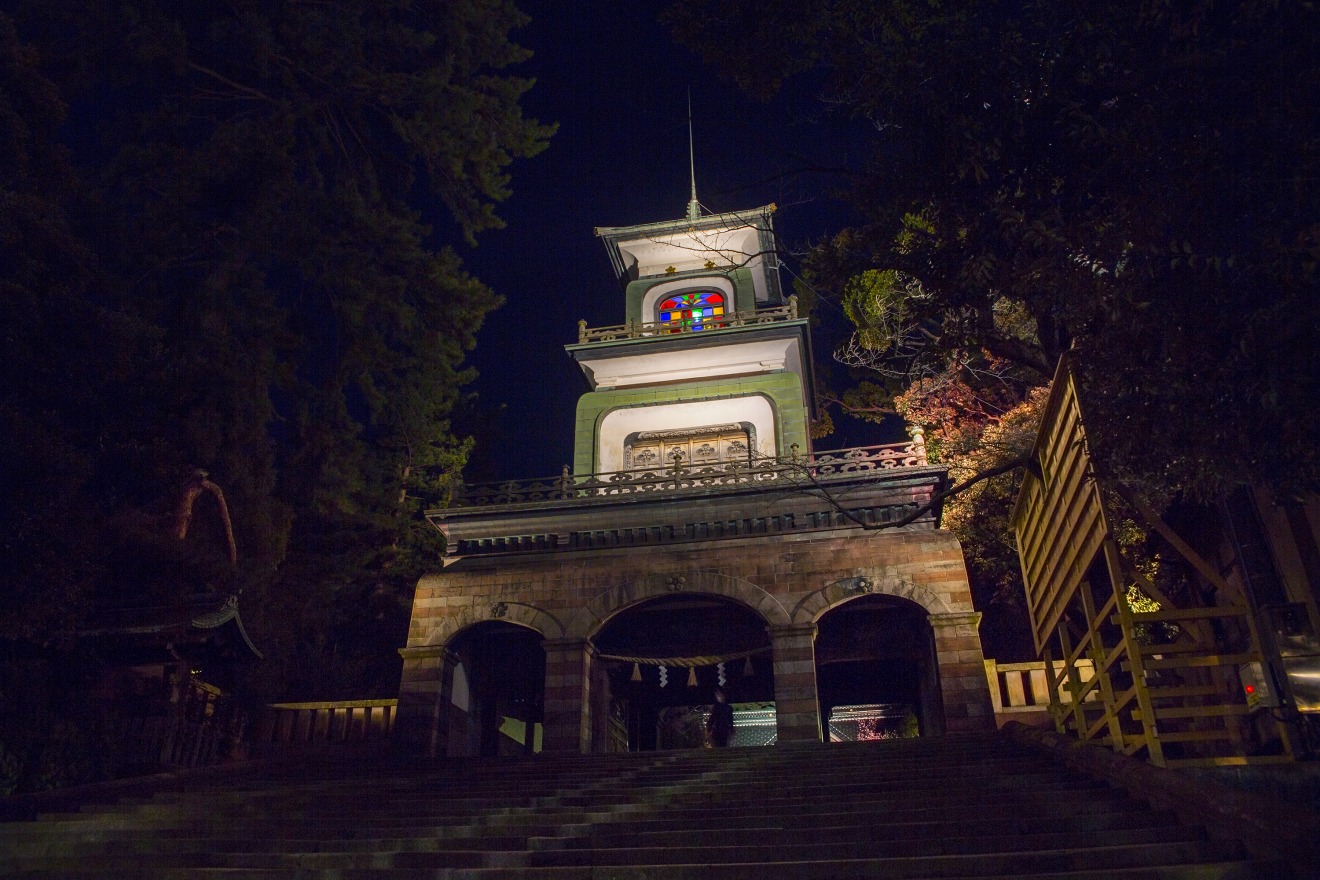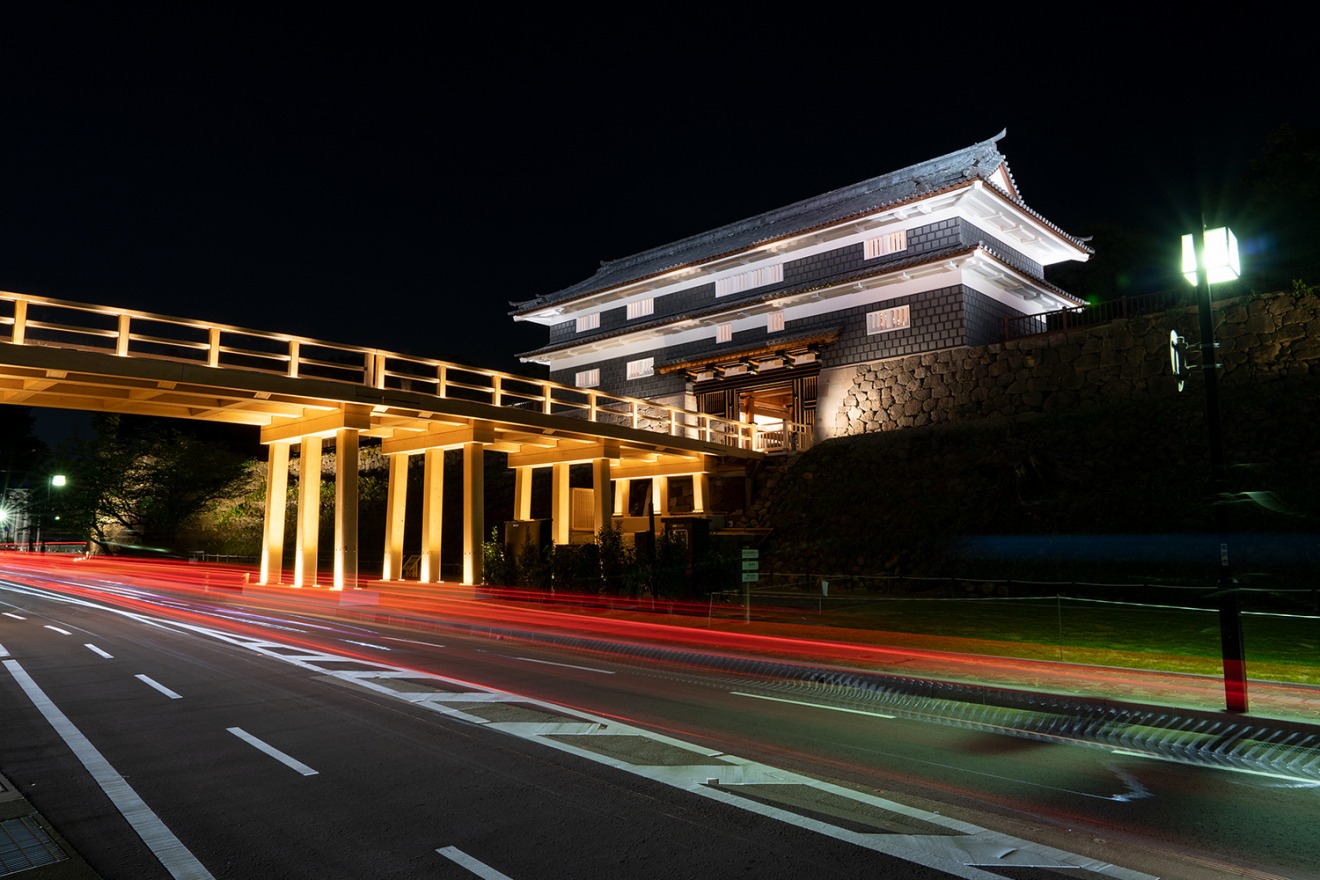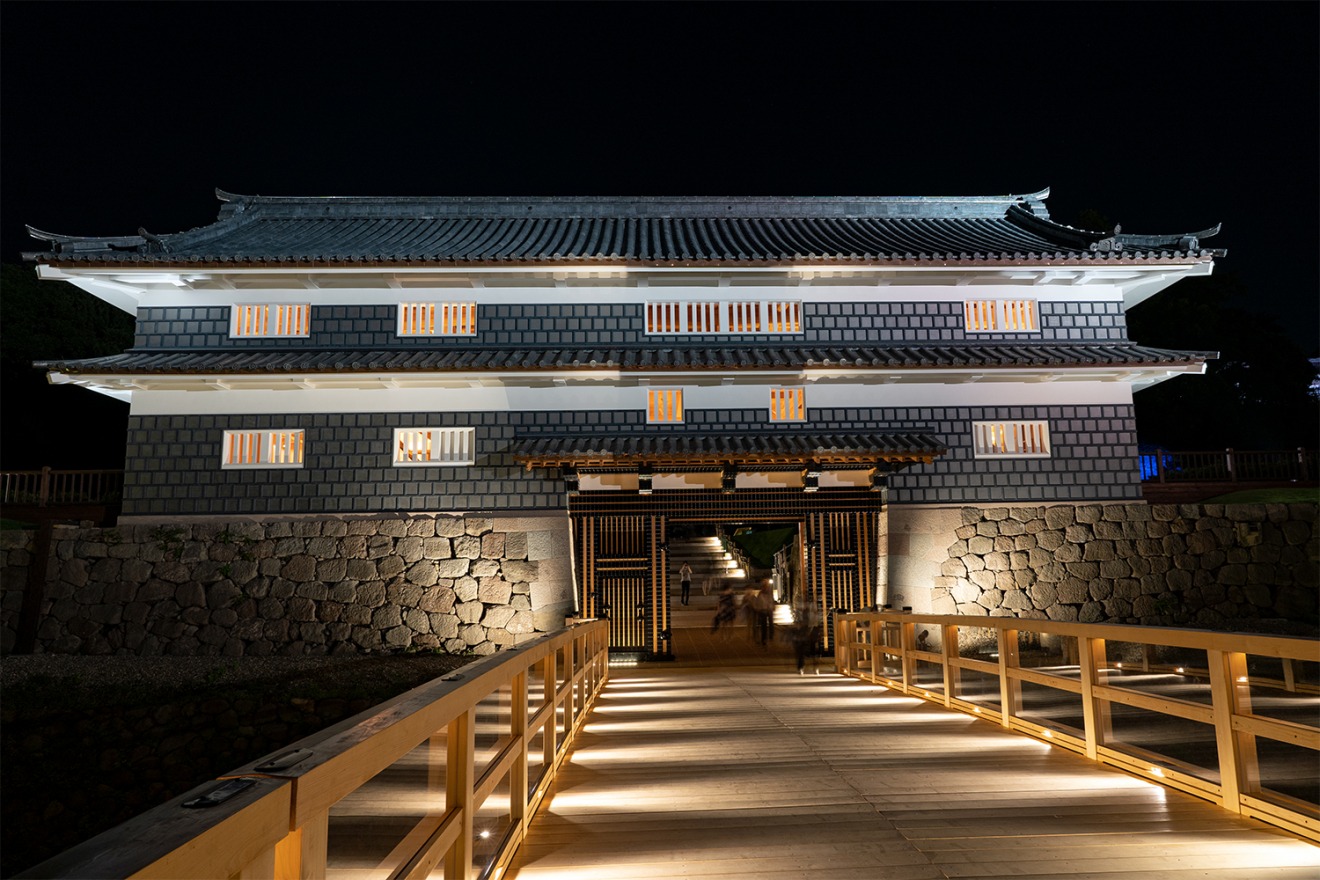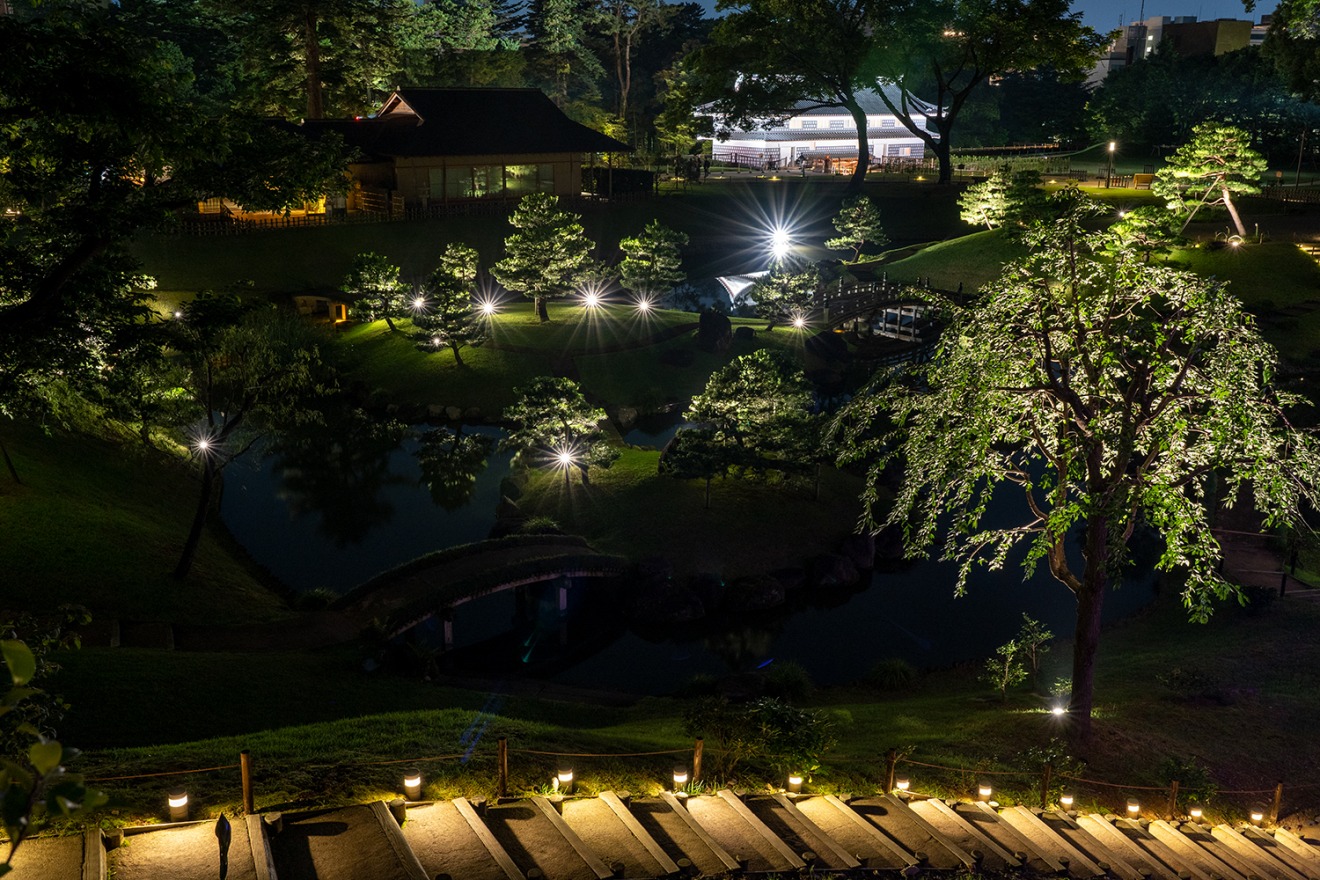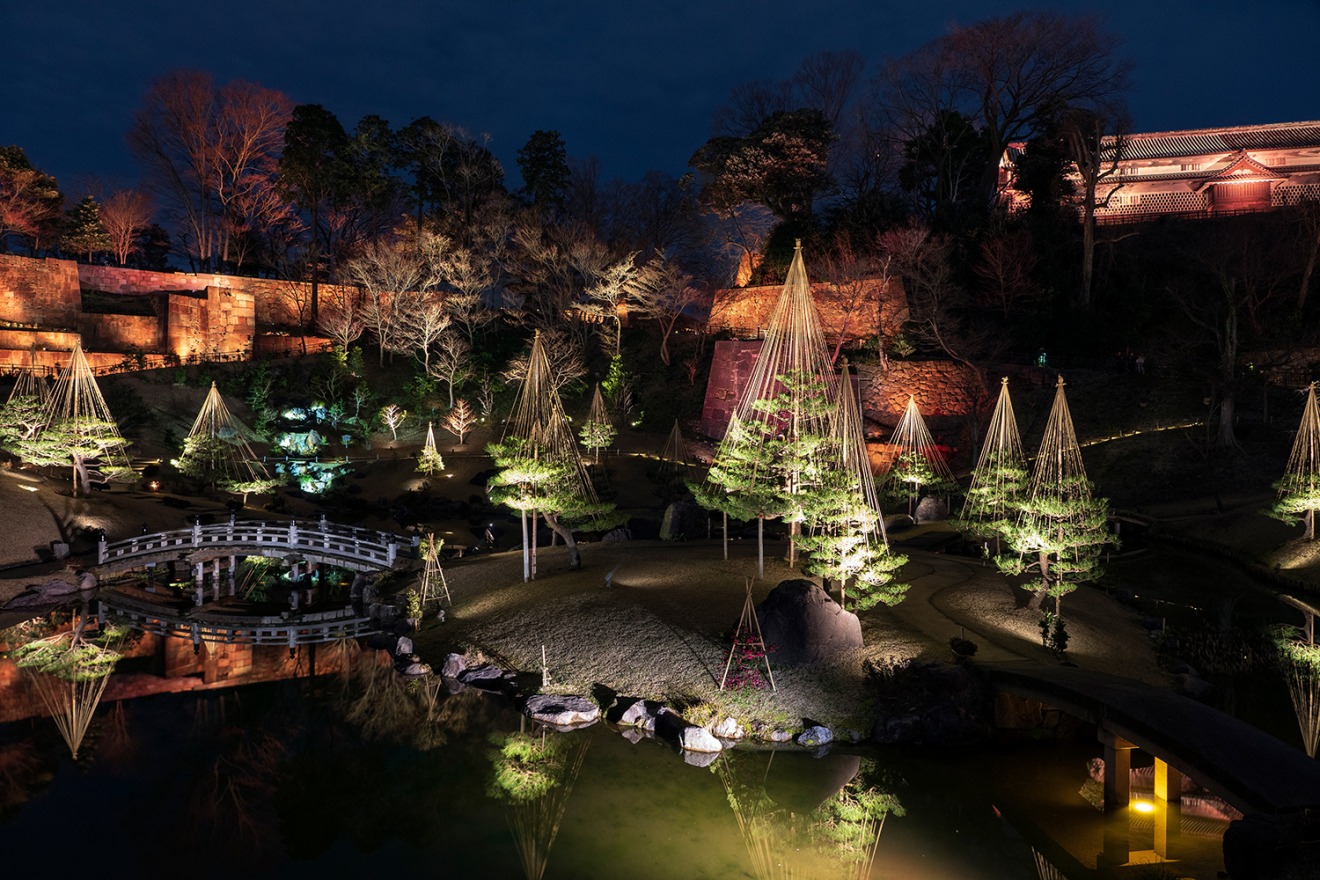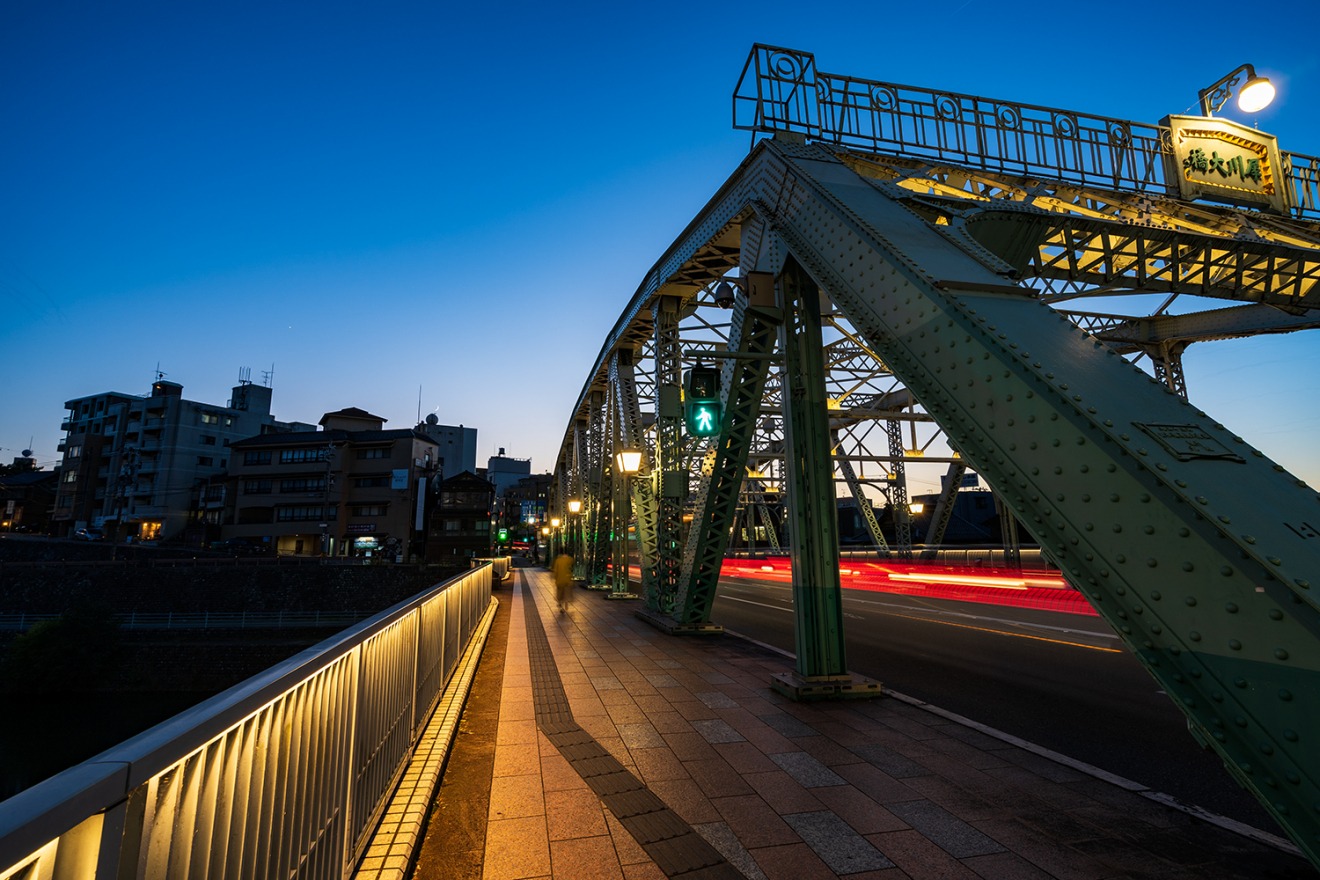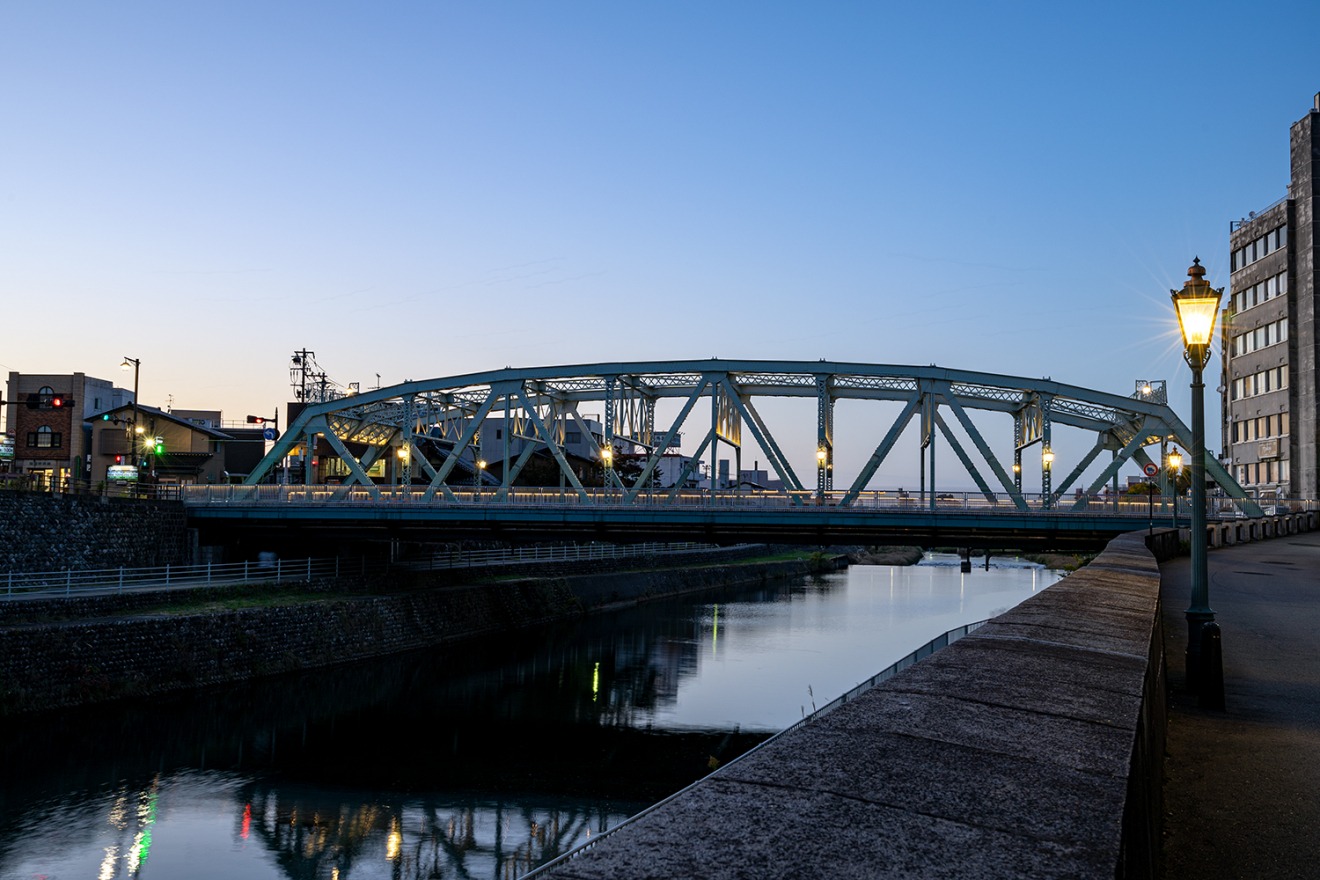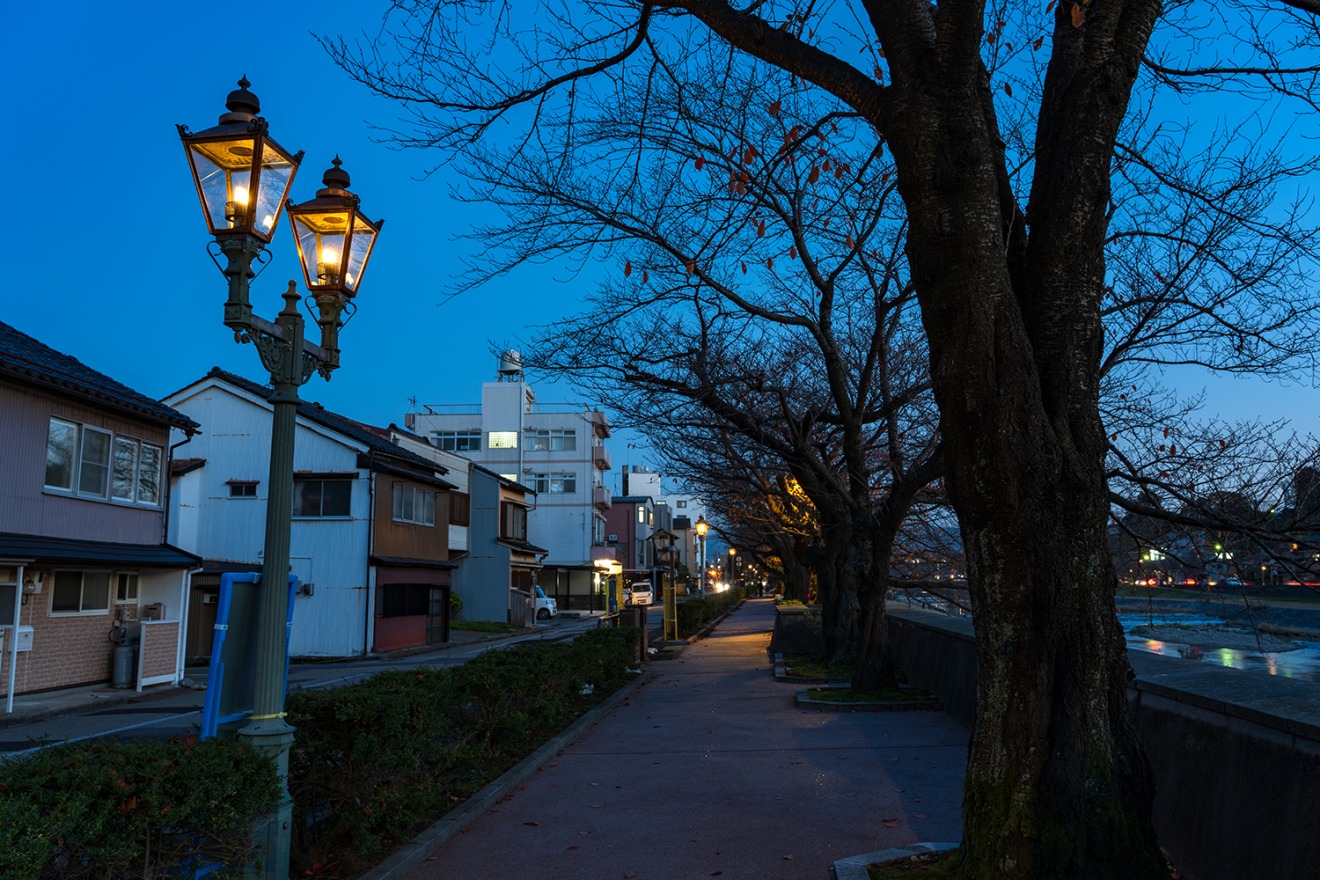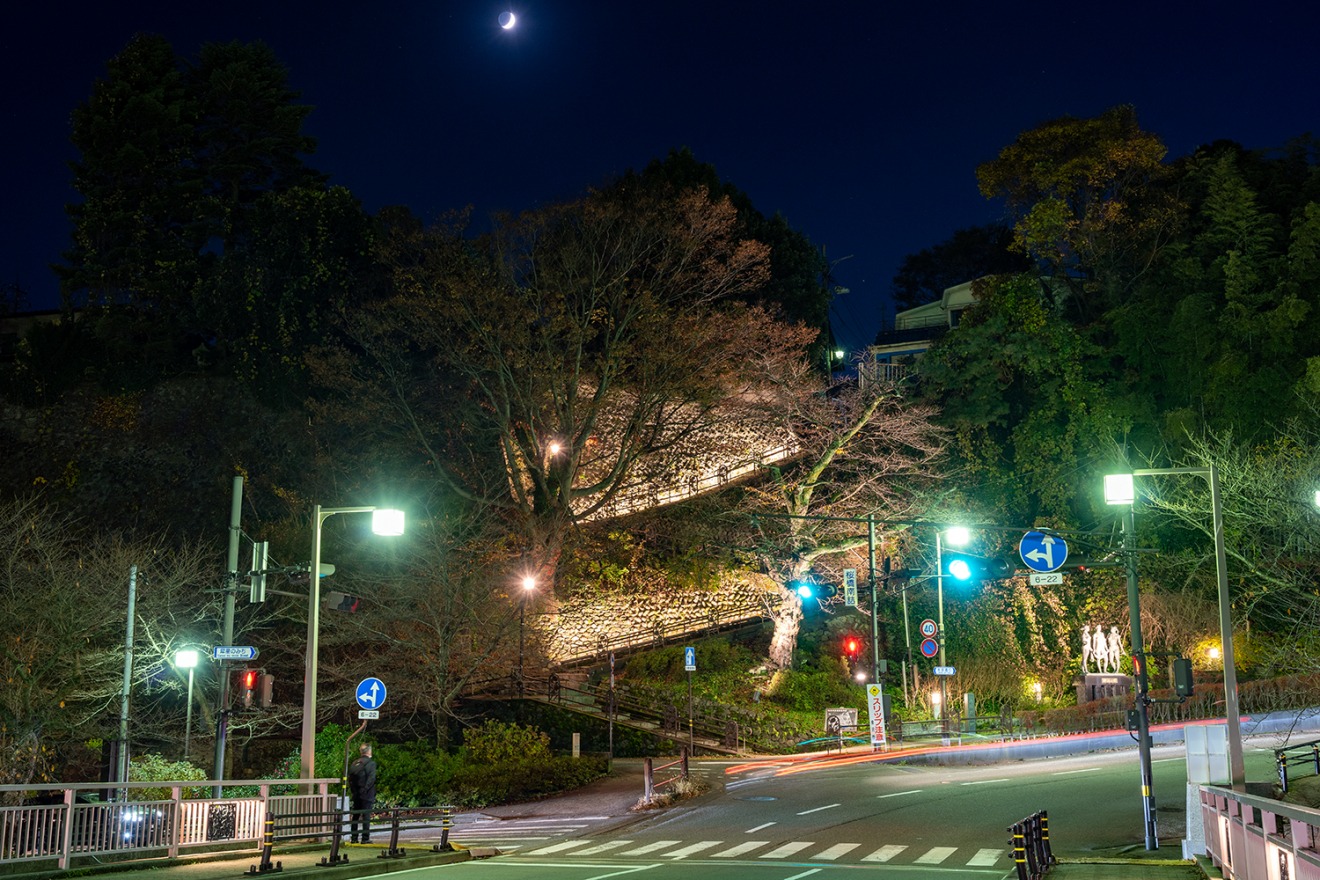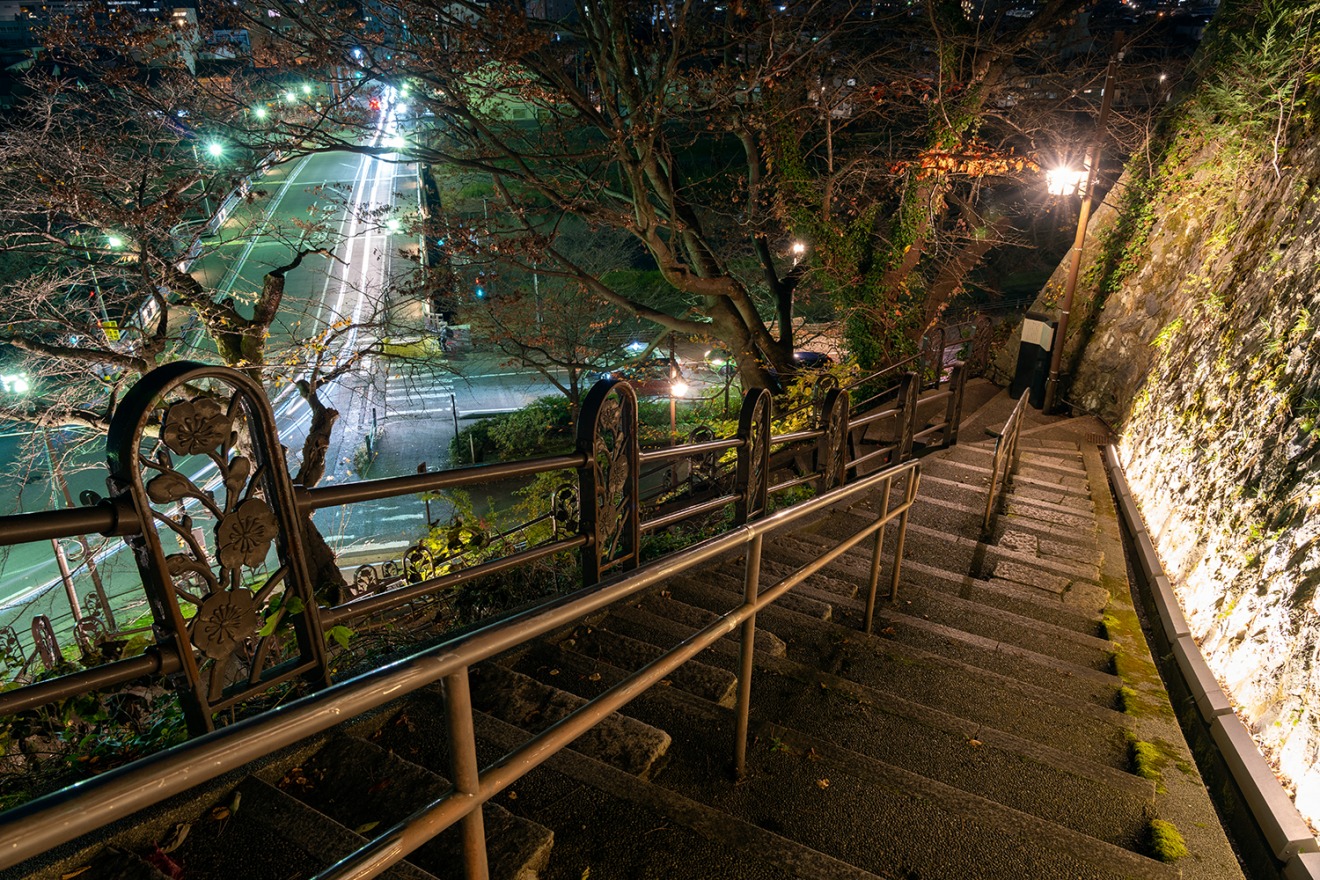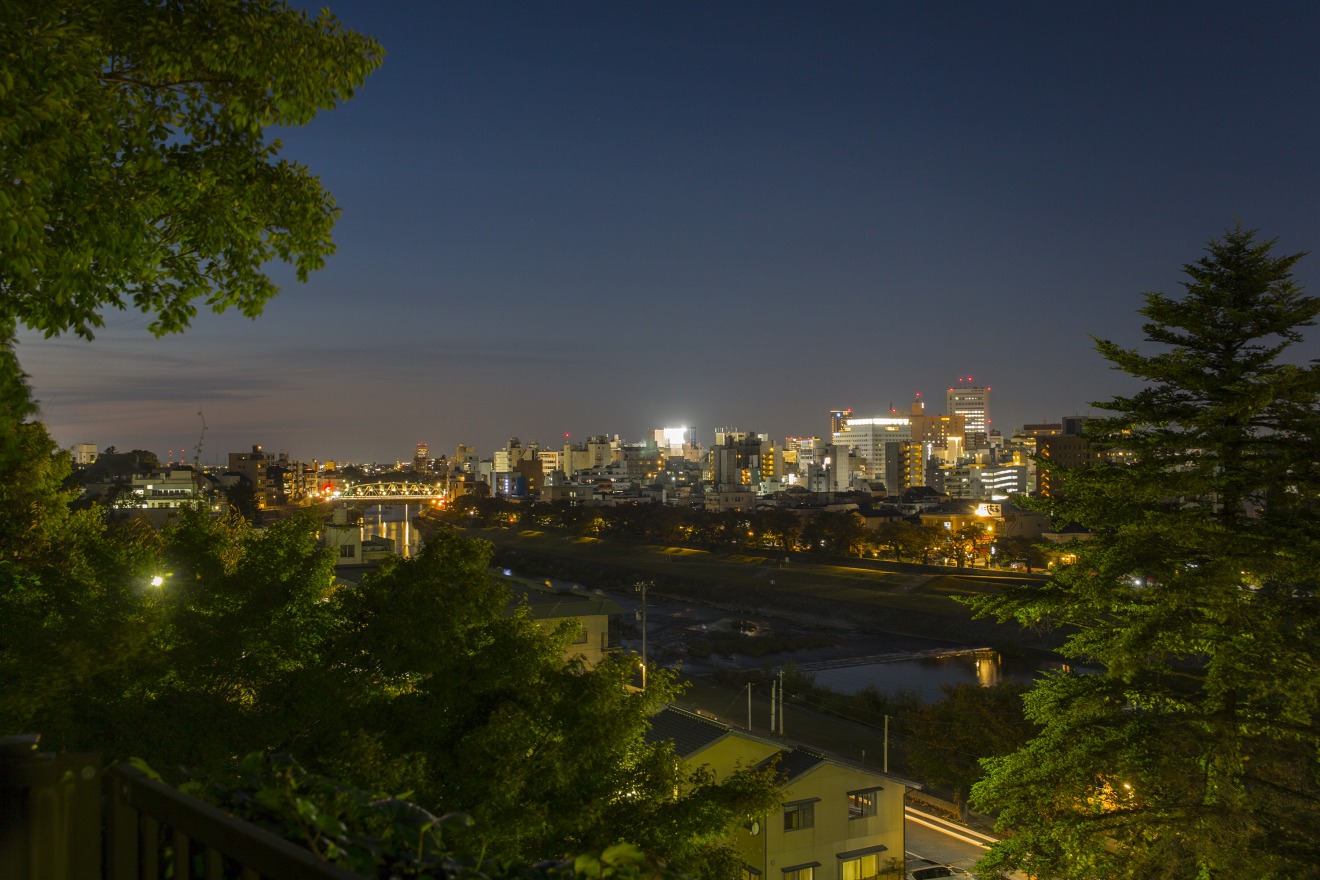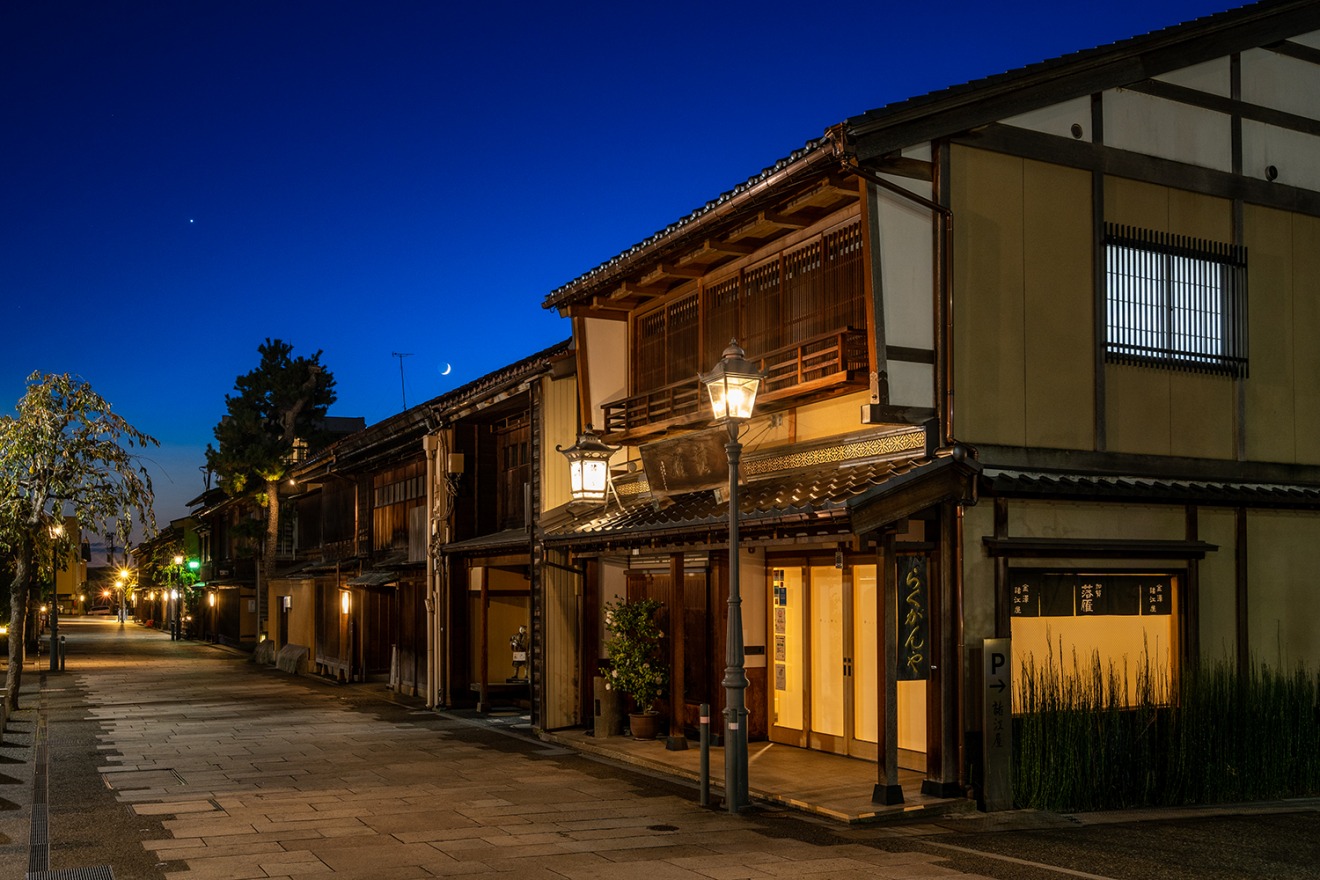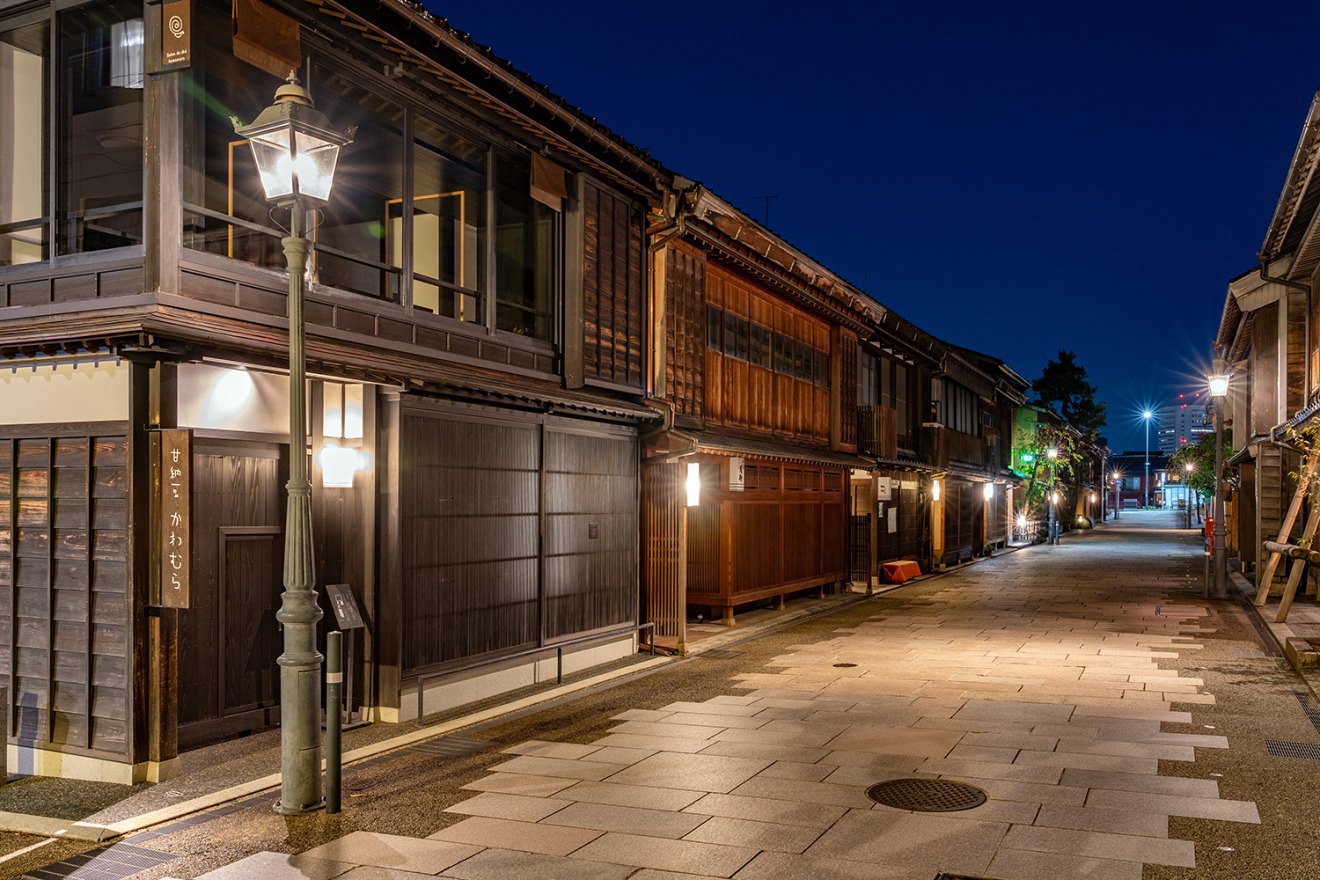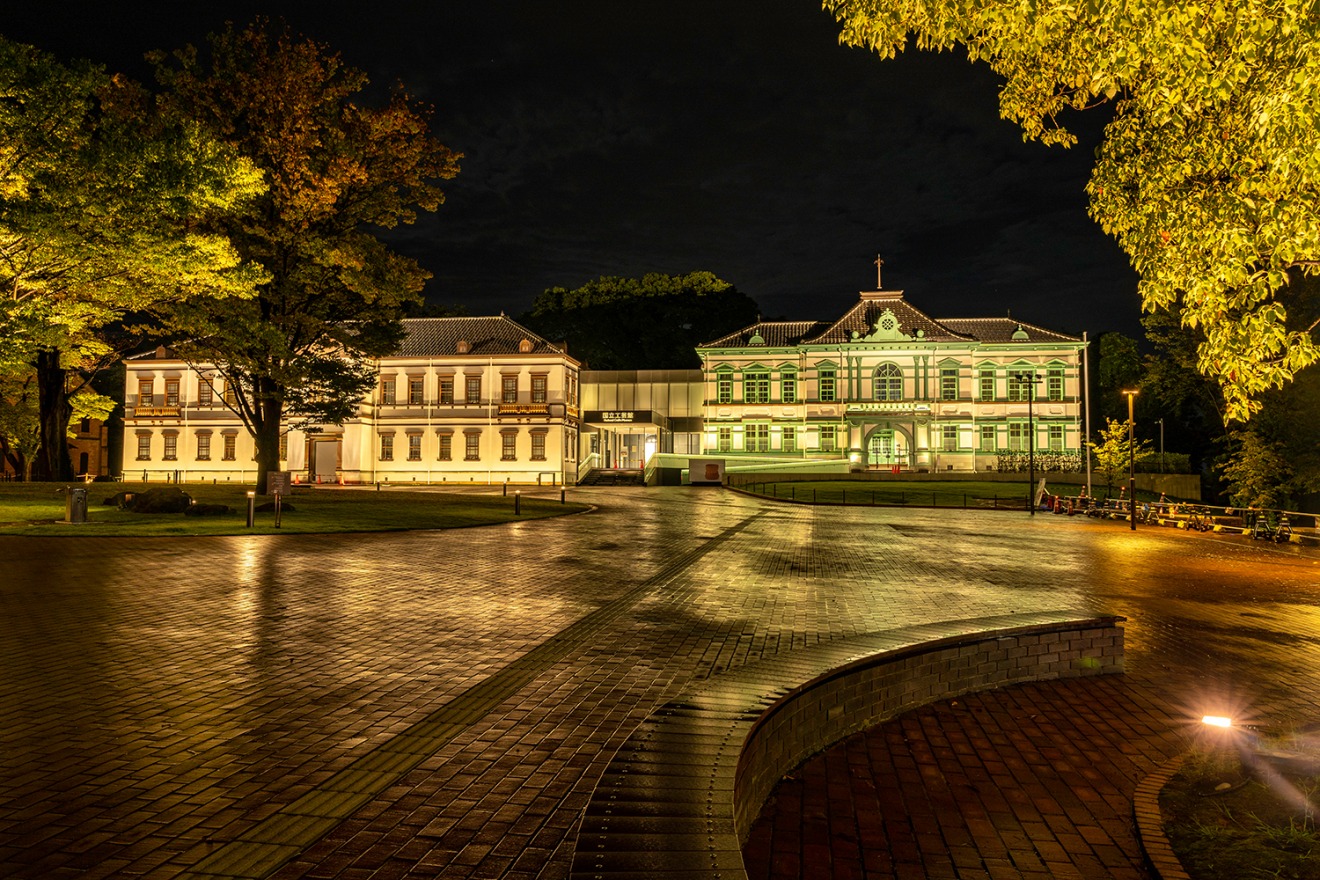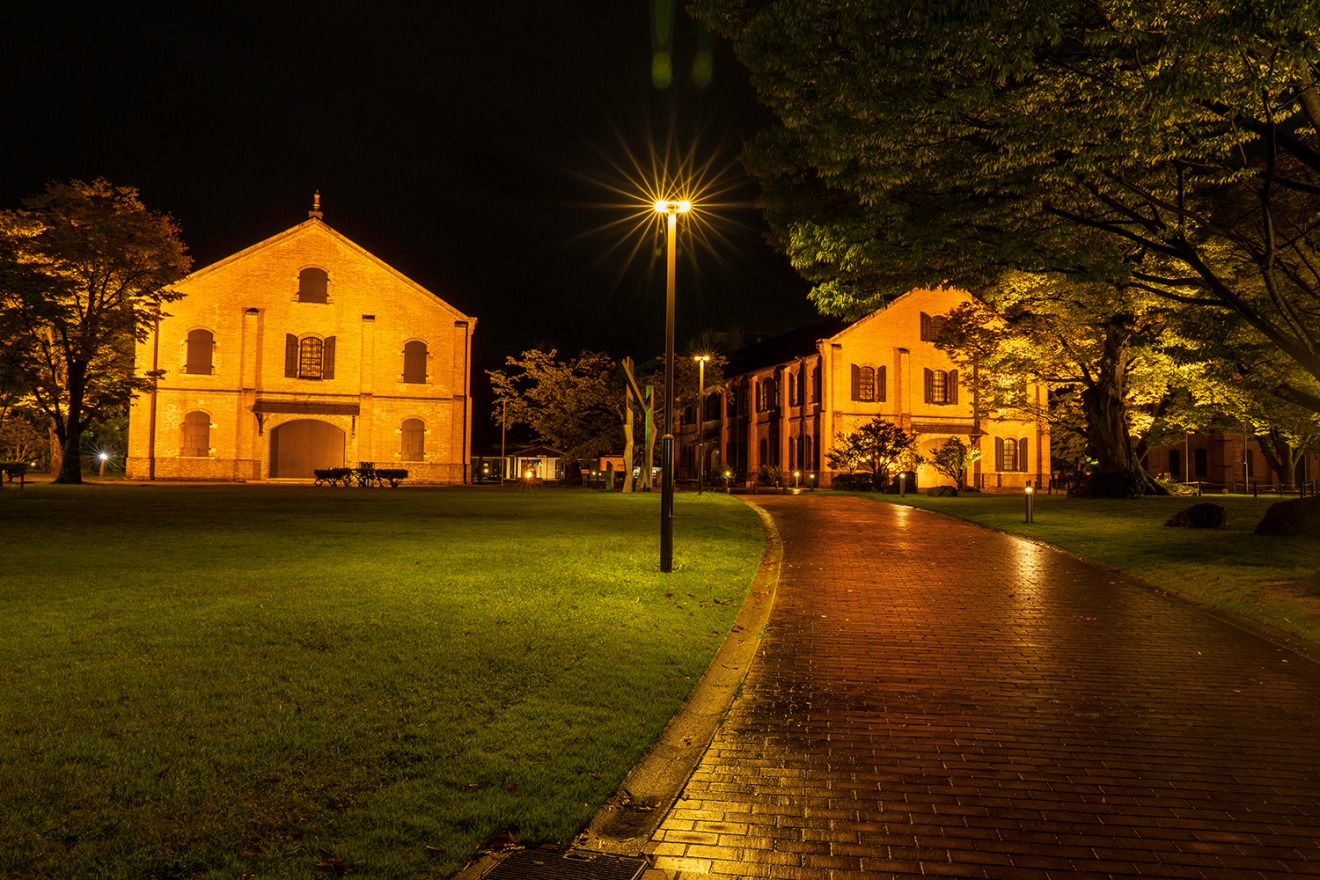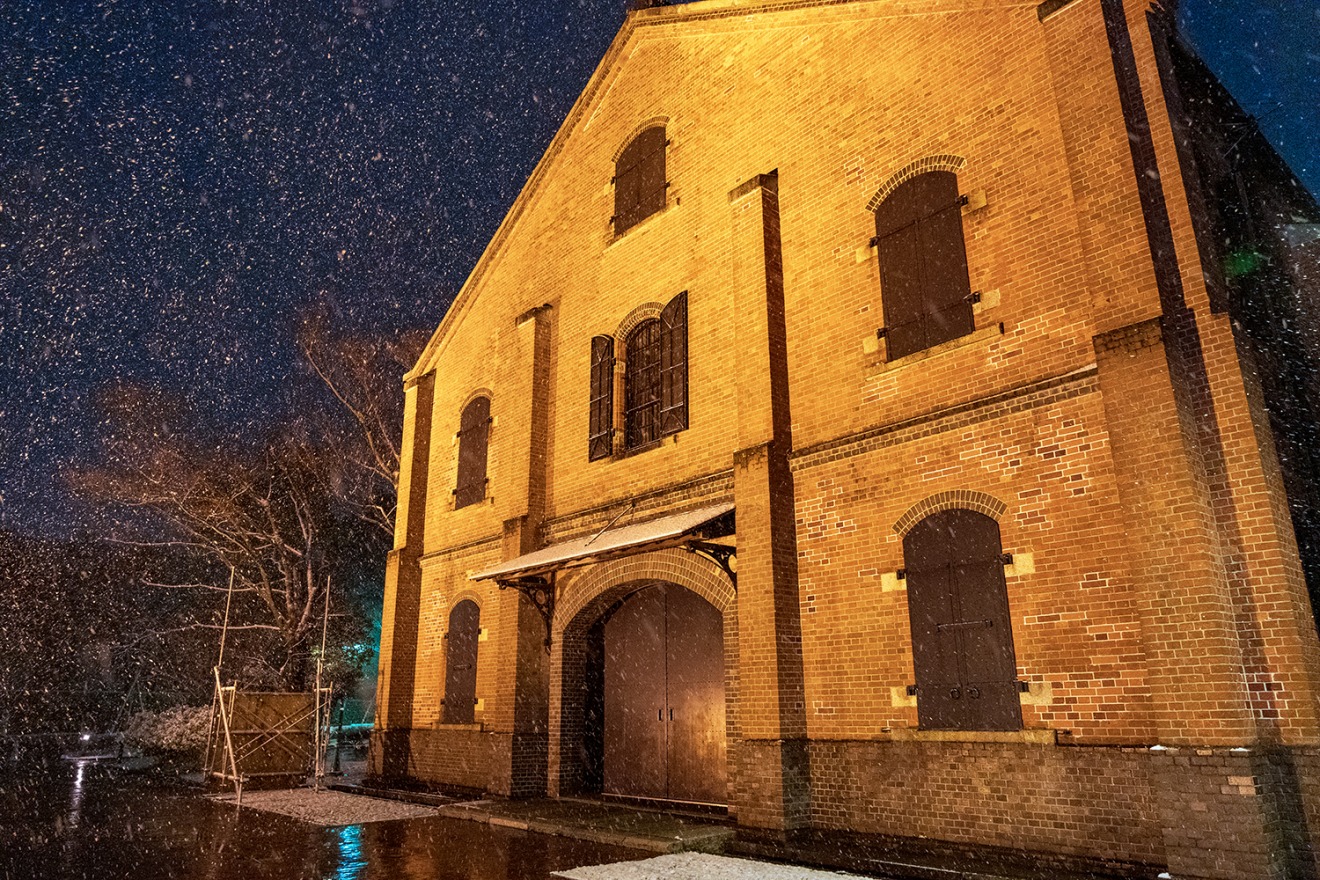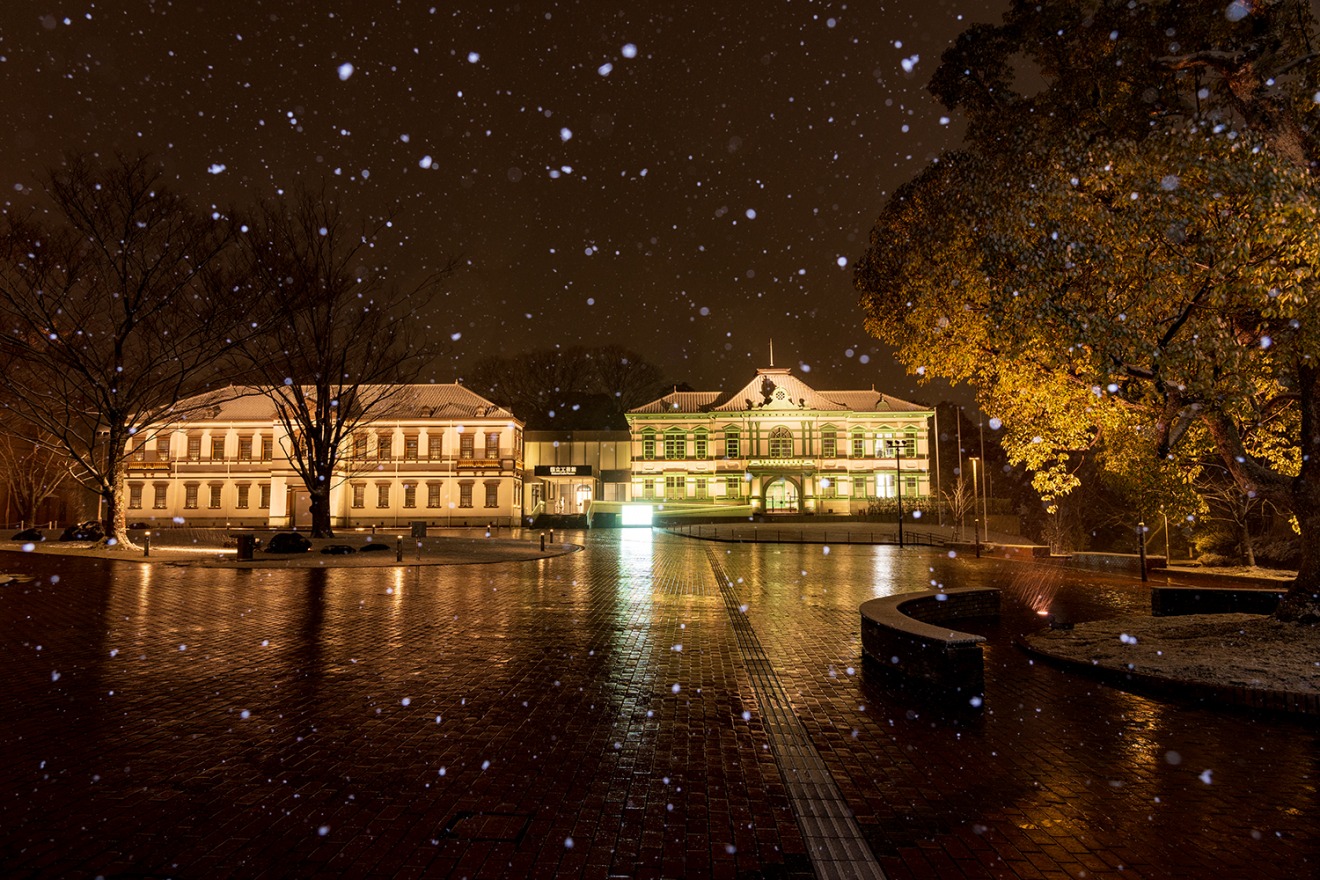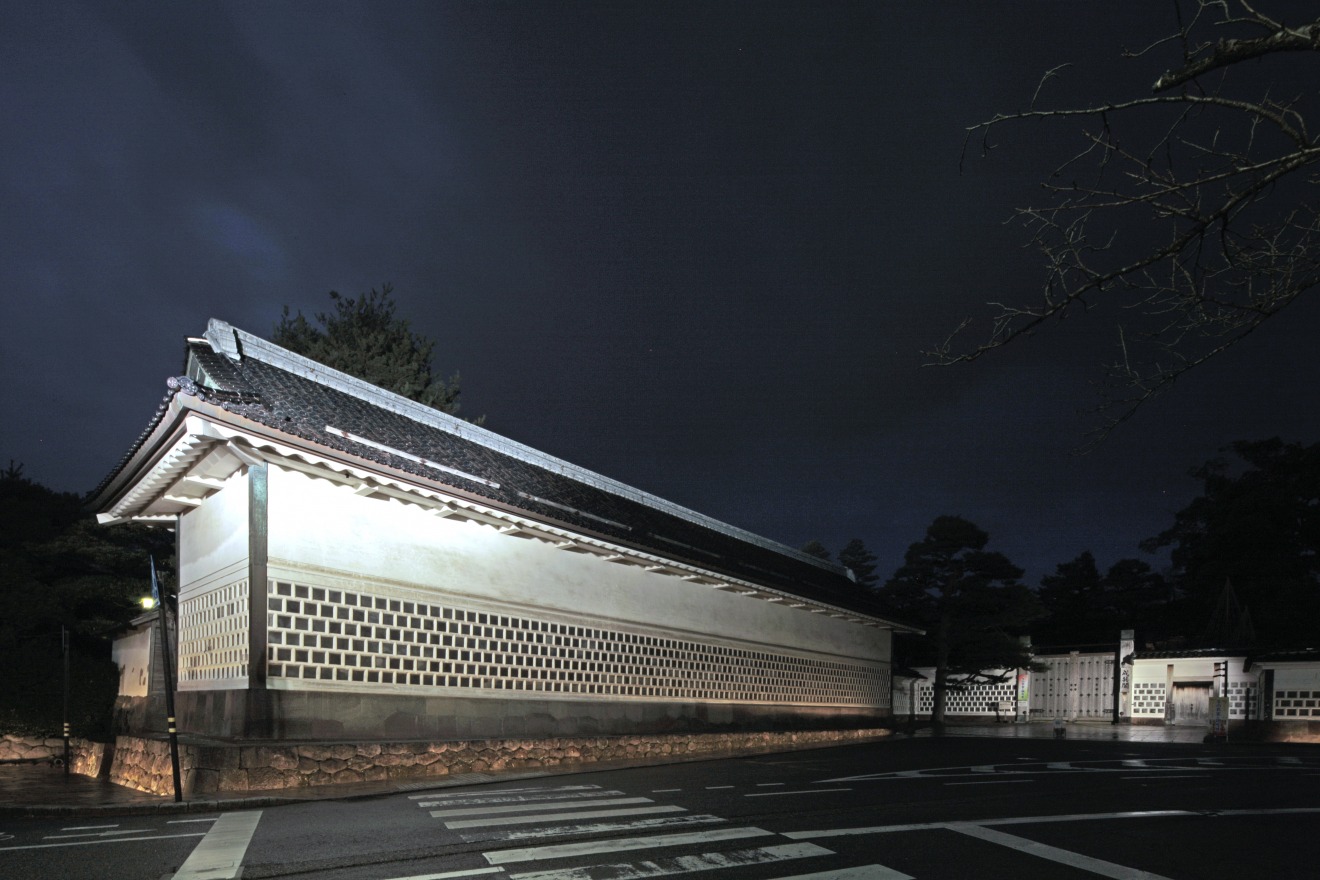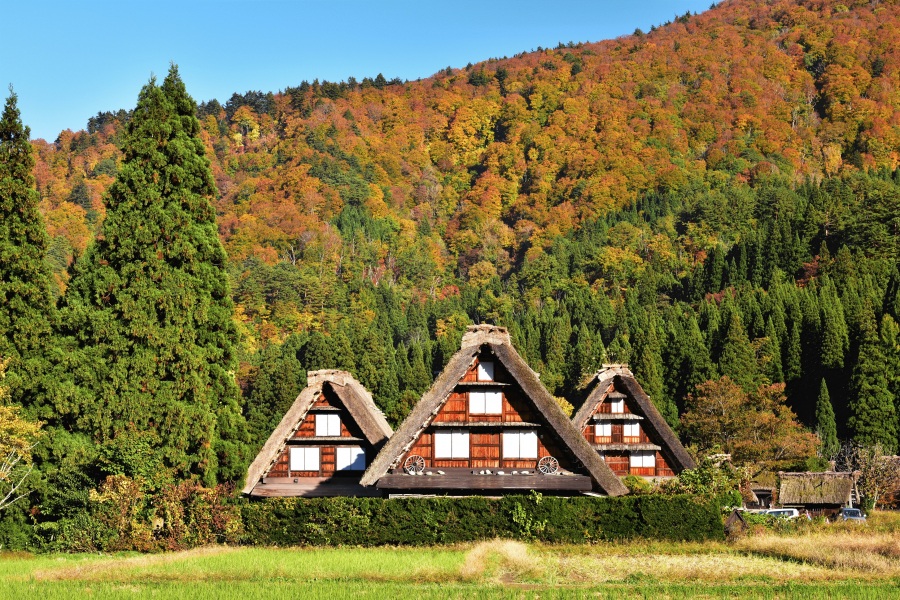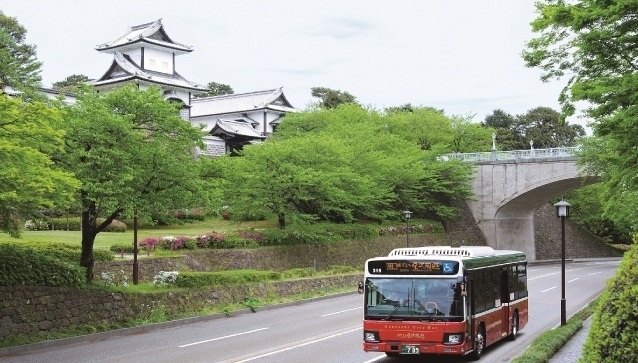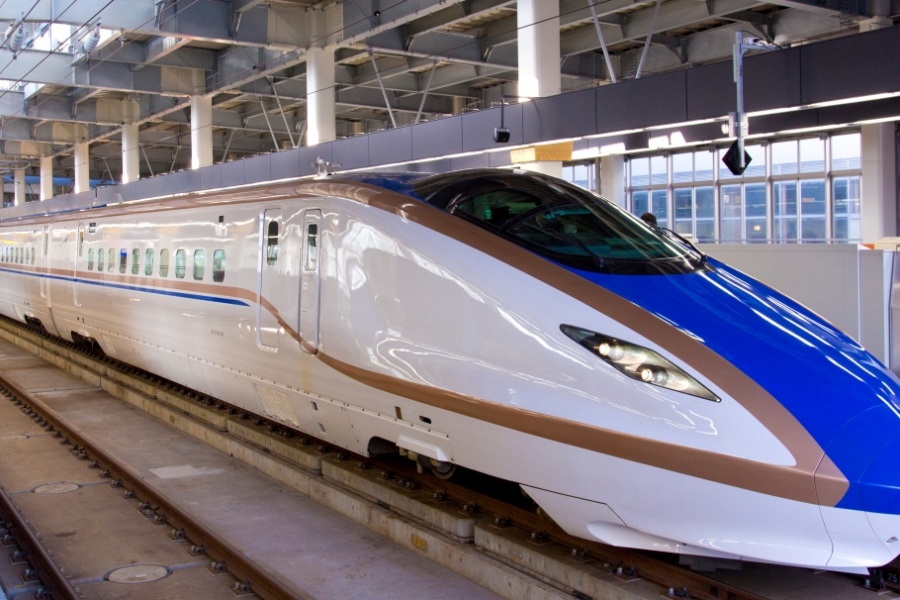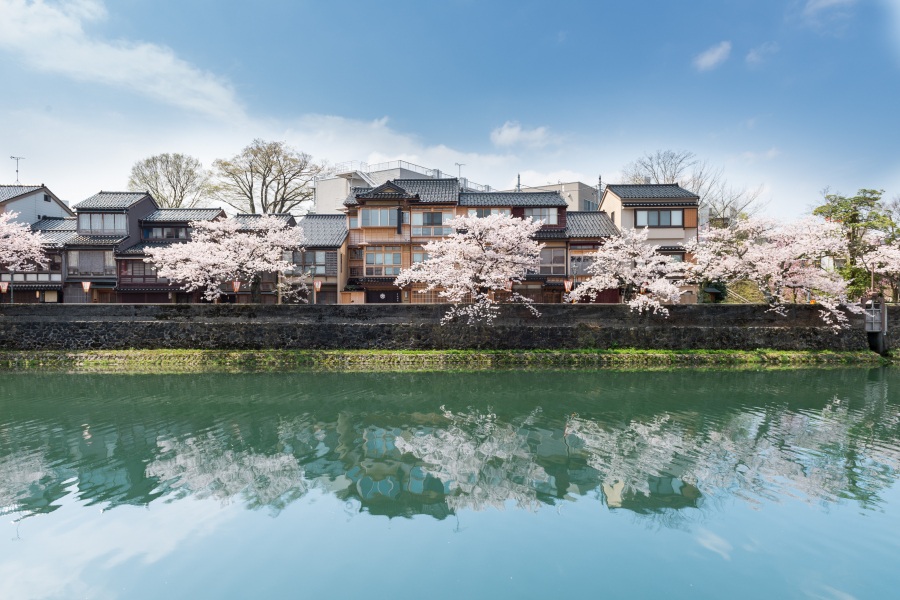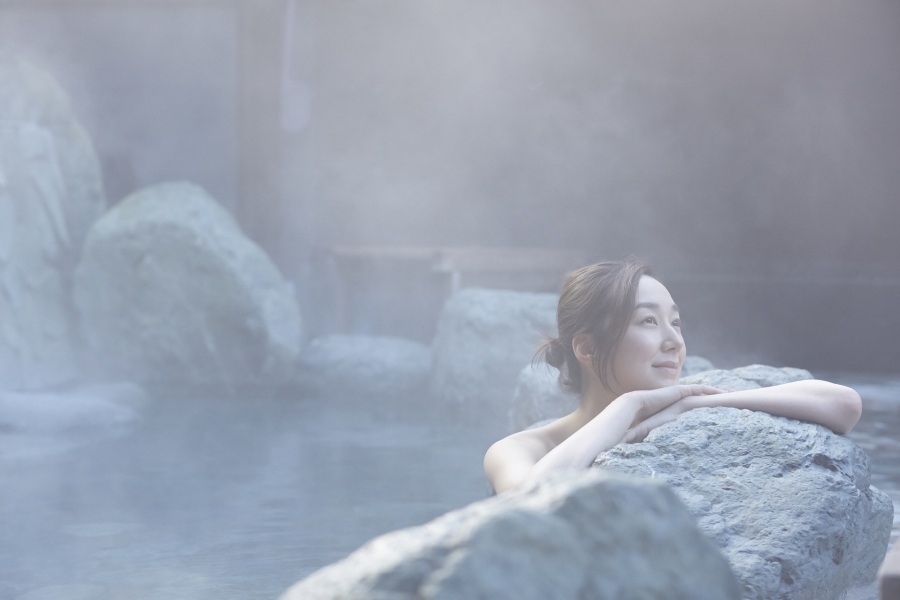See Kanazawa By Night! Recommended night spots & walking areas
Did you know that Kanazawa has a beautifully serene nightscape? On Saturdays, there is even a light-up bus service available for visitors to tour the city by night. See an entirely different side of Kanazawa after sunset, lit up by dazzling city lights, retro street lamps and glowing illuminations. Now that you’ve made it to Kanazawa, why not stay overnight and enjoy the night views?
*The city is illuminated all year round, but the hours are mostly from sunset to 9 or 10 p.m.
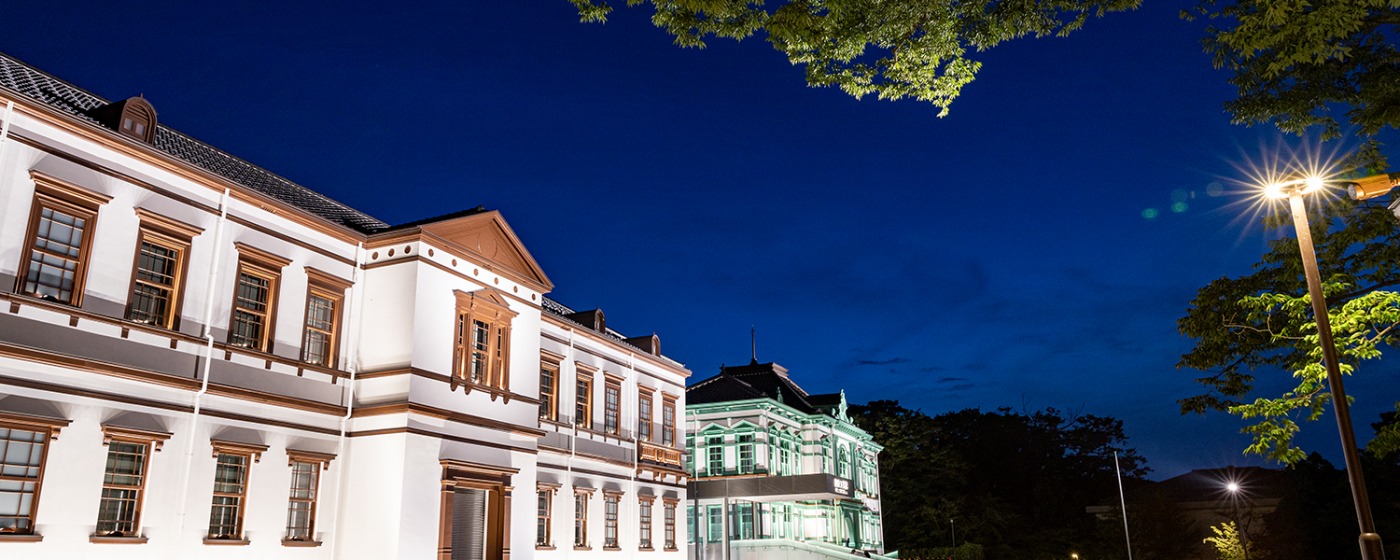
Don't miss these 5 light-up spots
First is Tsuzumi-mon Gate just outside the Kenrokuen Exit of Kanazawa Station. Every night, the gate is illuminated from sunset to midnight, when every hour on the hour, it changes colors for two minutes to reflect Japan’s five traditional colors (cochineal, indigo, grass, ochre, and ancient purple).
Oyama Jinja Shrine's main gate, designated as a National Important Cultural Property, is built in three different styles (Japanese, Chinese, and European). After dark, the colorful stained glass at the top of the gate comes to life.
Across from Oyama Jinja, Gyokusen-inmaru Garden in Kanazawa Castle Park is a popular sightseeing spot by night, where a light and sound show takes place on Saturdays.
Gyokusen-inmaru Garden(Kanazawa Castle)
Ishikawa-mon Gate (also designated as a National Important Cultural Property) in Kanazawa Castle Park is another symbol of Kanazawa By Night, as a dramatic black-and-white structure surrounded by stone walls.
The Asanogawa Bridge, a retro-modern triple-arched bridge built in the Taisho era (1912-1926) is a highlight of any stroll along the Asano River, together with Tenjin-bashi Bridge and Ume-no-Hashi Bridge upstream and Naka-no Hashi Bridge downstream.
Romantic panoramic nightscapes
Here are some easily accessible observation points where you can view not only Kanazawa’s night-time cityscape, but also (weather permitting) a seaside sunset and the starry sky above.
First, head up to the observation lobby on the 19th floor of the Ishikawa Prefectural Office, located an 8-minute bus ride from the west exit of Kanazawa Station. From here you can view the Sea of Japan, the Hakusan Mountain range, and all the way to the Tateyama Mountain range in Toyama Prefecture. The building is open until 8:00 p.m. (7:00 p.m. on weekdays from January to March), and on a clear evening, you can watch the sunset over the Sea of Japan.
Mount Utatsu, situated just above Higashi Chaya District, is famous for hosting three of the best viewpoints in Kanazawa: Boko-dai Observatory, Miharashi-dai, and Chobo-no-oka Hill. Local buses only run during the daytime, but at night you can either take a taxi or walk up the hill in about 20 to 30 minutes. Depending on the weather, and if you are lucky, from here you can see beyond the city lights to fishing fires on the sea and twinkling stars above.
Further up the mountain, about a 30-minute drive from Kanazawa Station, the nature-rich recreational village of Kigoyama Peak offers even higher observation decks. Not only can you view the city skyline and fishing fires on a clear night, this is a fine place for astronomical observation.
Recommended night walk ❶ 21st Century Museum of Contemporary Art, Kanazawa
Here are five areas in the city where you can enjoy an atmospheric stroll after dark.
First, from Korinbo to the 21st Century Museum of Contemporary Art, Kanazawa area.
From Korinbo, a dazzling downtown area at night, walk along Hirosaka Street toward Kenrokuen Garden. You will see the classic brick Ishikawa Four High School Memorial Cultural Exchange Center and the Shiinoki Cultural Complex, Ishikawa Prefecture on your left, with the stone walls of Kanazawa Castle lit up in the distance. The 21st Century Museum of Contemporary Art, Kanazawa is also surrounded by permanent outdoor exhibits illuminated by the museum's lights and streetlamps.
Ishikawa Four High School Memorial Exchange Center
The 21st Century Museum of Contemporary Art
The Retro Experience Room and other facilities of the Ishikawa Four High School Memorial Cultural Exchange Center are open until 9:00 p.m., and the Shiinoki Cultural Complex, Ishikawa Prefecture and 21st Century Museum of Contemporary Art, Kanazawa Interaction Zone are open until 10:00 p.m. (both free of charge). These are also good places to take a break from walking if you get tired.
Recommended night walk ➋ Higashi Chaya Ditstrict and Kazue-machi Chaya District
The Higashi Chaya District may be crowded with tourists during the daytime, but after 5:00 p.m., many of the cafes and shops close their doors, and the gently glowing gas lamps create a magical scene. Venture into the alleyways to find restaurants and bars that blend in with the old townscape for a chic evening.
In the Kazue-machi Chaya District facing the Asano River, two steep staircases called Kuragarizaka (dark slope) and Akarizaka (light slope) are hidden in a maze of alleyways. Nearby, see the illuminated Asanogawa Ohashi Bridge, a registered tangible cultural property, the wooden-style Ume-no-Hashi Bridge and Naka-no-Hashi Bridge, the curved Tenjin Hashi Bridge, and other bridges all individually lit up over the Asano River.
Recommended night walk ❸ Nagamachi District to Oyama Jinja Shrine and Kanazawa Castle Park
At night, the Nagamachi District will make you feel like you have been whisked back in time, where a samurai might emerge from just around the corner. Although adjacent to downtown Kanazawa, Nagamachi is a quiet residential area. As you head toward Oyama Jinja Shrine, the Shinmon gate with its five-colored Guillaman (stained glass) will catch your eye in the distance. This shrine once served as a lighthouse for ships passing through the Sea of Japan.
Cross the illuminated Nezumitamon Bridge from Oyama Jinja Shrine and pass through the Nezumitamon Gate into Kanazawa Castle Park and Gyokusen-inmaru Garden. The surrounding stone walls and the Sanjikken Nagaya, designated as a National Important Cultural Property, are illuminated in a variety of colors to the accompaniment of music for about seven minutes, so take your time to enjoy the spectacle.
Recommended night walk ❹ Saigawa Ohashi Bridge to Sakura Bridge, Nishi Chaya District
Adjacent to Katamachi, Kanazawa's most popular nightlife spot, the Nishi Chaya District is deeply associated with Japanese writers who established an era, including the great writer Saisei MURO, the best-selling author of the Taisho era (1912-1926), Seijiro SHIMADA, Chuya NAKAHARA, and Yasushi INOUE. Enjoy a memorable evening stroll as if wandering around the world of a novel.
The path leading from the illuminated Saigawa Ohashi Bridge to the Sakura Bridge upstream is called Saisei no michi (Saisei's Path), a walk that was much-loved by Saisei MURO. Along the riverside, you will find a nostalgic atmosphere lined with illuminated cherry trees. W Slope, which appears in Yasushi INOUE's autobiographical novel "Kita no Umi" (The North Sea), is also illuminated, and offers a panoramic view of the city from the top. Nishi Chaya District, where Seijiro SHIMADA lived and which often appears in Saisei's works, also takes on an enchanting aura as twilight falls.
Recommended night walk ❺ Around Honda Park
The Honda Park area has been gaining popularity with the opening of the National Crafts Museum, the only national art museum in Japan dedicated to crafts. The chalk-white building of the museum is a reconstruction of two former army facilities built in the Meiji era (1868-1912), which are registered tangible cultural properties of Japan.
The adjacent Ishikawa Red Brick Museum (Ishikawa Prefectural Museum of History and Kaga Honda Museum), a former military armory, is a designated National Important Cultural Property. It too is illuminated, creating a striking contrast with the National Crafts Museum. Seisonkaku, the Maeda family palace in front of the National Crafts Museum and adjacent to Kenrokuen Garden, is also lit up, with its distinctive black-and-white Namako walls shimmering gracefully in the darkness.
